Abstract
Background
The improvement of renal allograft survival by pre‐transplantation transfusions alerted to the potential detrimental effect of transfusions in cancer treatment.
Objectives
This meta‐analysis evaluates the role of perioperative blood transfusions (PBT) on colorectal cancer recurrence. This is accomplished by updating the results of a previously published meta‐analysis (Amato 2006) to December 2009.
Search methods
Papers were retrieved using Medline, EMBASE, the Cochrane Library, trials web‐based registries, or the CCG Database. The search strategy was: {colon OR rectal OR colorectal} WITH {cancer OR tumor OR neoplasm} AND transfusion. The publication bias was balanced by reviewing the proceedings of international congresses.
Selection criteria
Patients undergoing curative resection of colorectal cancer (classified either as Dukes stages A‐C, Astler‐Coller stages A‐C2, or TNM stages T1‐3a/N0‐1/M0) were included if they had received blood products within one month of surgery. Excluded were patients with distant metastases and studies with short follow‐up or no data.
Data collection and analysis
A specific form was used for data collection. Data was cross‐checked, using the most recent publication in case of repetitive ones. Papers' quality was evaluated using the method by Evans and Pollock. Odds ratios (OR, with 95% confidence intervals) were computed for each study, and pooled estimates were generated by RevMan (version 5). When available, data were stratified for risk factors of cancer recurrence.
Main results
Updating the previous review through December 2009 identified 41 additional papers, for a grand total of 278 references. Two‐hundred and fourty‐two of them were excluded because they analyzed survival (n=27), were repetitive (n=29), letters/reviews (n=71) or had no data (n=115). Thirty‐six studies on 12,127 patients remained included: 23 showed a detrimental effect of PBT; 22 used multivariable analyses, and 14 found an independent PBT effect. Pooled estimates of PBT effect on recurrence in randomised studies yielded an OR of 1.42 (95% CI, 1.20 to 1.67) against transfused patients. Stratified meta‐analyses confirmed these findings also by site and stage of disease, regardless of timing, type, and in a dose‐related fashion, although heterogeneity was detected. Data on surgical techniques was not available for further analysis.
Authors' conclusions
This updated meta‐analysis confirms the previous findings and supports the association of PBT on the recurrence of curable colorectal cancers. However, since heterogeneity was detected and the effect of surgical technique could not be assessed, a causal relationship cannot still be claimed. Carefully restricted indications for PBT seems necessary.
Plain language summary
Does perioperative blood transfusion affect the recurrence rate of potentially curable operations for colorectal cancer?
This review include 36 studies, identified from 278 references retrieved until December 2009, and report a moderate association between colorectal cancer recurrence and perioperative transfusions, with an OR of 1.42 (95% CI, 1.20 to 1.67). Similar estimates are present in several subgroup meta‐analyses, as well as in meta‐analyses stratified for known risk factors. These findings support carefully restricted indications for perioperative blood transfusions in colorectal cancer patients operated for cure, and continue to await the results of studies addressing the role of surgeon‐related risk factors on the need for transfusion and disease recurrence.
Background
It is well established that renal allograft survival is improved by blood transfusions before transplantation, with a dose‐response relationship between the number of transfused units and long‐term allograft survival rates (Opelz 1973; Opelz 1978; Sanfilippo 1984). However, the exact mechanisms of the host immunomodulation remain unclear (Terasaki 1984). Prompted by the identification of this lasting immunosuppressive effect, in 1981 Gantt expressed concern about the possible adverse effects of transfusions in patients being treated for cancer (Gantt 1981). Within one year, the first experimental study showing tumor growth promotion by allogenic blood transfusion was published (Francis 1981) and, shortly after, the first retrospective report linking perioperative blood transfusions (PBT) to colorectal cancer recurrence appeared in the same journal (Burrows 1982). Following these early reports, several other studies have been published in the literature, with conflicting results as to the verification of the working hypothesis, that is that PBT, by decreasing the mechanisms of cancer immune surveillance, is responsible for increased colorectal cancer recurrence.
Objectives
The objective of this review is to evaluate the recurrence rates of colorectal cancer for patients operated with curative intent and receiving perioperative blood transfusion (PBT), compared to the same type of patients not receiving PBT. We want to evaluate the hypothesis that PBT result in increased colorectal cancer recurrence in these patients, as indicated by some papers in the literature, although at variance with others. Furthermore, a meta‐analysis can lead to a better estimation of the transfusion effect (if any), and to a minimization of the type‐II statistical error, due to small sample sizes in some of the reported studies.
Methods
Criteria for considering studies for this review
Types of studies
We will consider both randomised controlled trials (RCTs), prospective cohorts and retrospective surveys.
Types of participants
Patients treated either by colonic resection, anterior resection of the rectosigmoid, or abdominoperineal excision of the rectum with curative intention; disease classified as either Dukes stages A to C, Astler‐Coller stages A to C2, or TNM stages T1‐3a/N0‐1/M0; a negligible proportion (<5%) or absence of patients treated with adjuvant therapy. We will exclude studies considering patients with distant metastases at surgery; studies with follow‐up less than six months; studies in which crude recurrence rate or disease‐free survival were not indicated; and studies in which control patients received some blood components
Types of interventions
Any amount of blood products given to the patients is considered a transfusion. The type of blood component used in each study will be searched consistently throughout, in order to identify a specific effect, if any. The perioperative period included one month before and after the operation, comprising surgery.
Types of outcome measures
The primary outcome will be colorectal cancer recurrence, measured either as crude recurrence rate or, when this is not available, its actuarial estimate (i.e., 1 ‐ disease‐free survival). Survival or mortality will be recorded and qualitatively discussed, but not quantitatively assessed in this meta‐analysis, since it is less temporally related and less biologically associated with PBT.
Search methods for identification of studies
A search of the literature published between January 2005 and December 2009 will be conducted by scanning the Index Medicus, searching MEDLINE, EMBASE, the Cochrane Central Register of Controlled Trials (CENTRAL), the controlled trials register at www.controlled‐trials.com, and the CCCG Specialised Register. The following MESH terms and search strategy will be used: {colon OR rectal OR colorectal} WITH {cancer OR tumor OR neoplasm} AND transfusion.
The bibliographies of the retrieved articles will be examined thoroughly to identify further eligible studies. The tendency not to publish negative trials will be balanced by an inspection of any retrieved proceedings of international congresses of surgery. There will be no language restrictions.
The newly collected studies will be integrated with the studies identified by the previous Cochrane systematic review on this subject matter (Amato 2006) which, conversely, was an update of a published meta‐analysis (Amato 1998).
Data collection and analysis
Also for this updated review, the authors analysed data on the primary outcome published in English (or with an English abstract) between January 2005 and December 2009, using the Cochrane methodology and software.
As suggested by the Meta‐Analysis Cooperative Group, the present review will consider both RCTs, prospective cohorts and retrospective surveys, since its aim is mostly "hypothesis‐generation". To guarantee the Cochrane high standards, however, separate analyses will be conducted for these types of studies, and their results compared.
A specific data extraction form will be used to help gather all necessary information. Data extraction will be cross‐checked by two reviewers (AA and MP) separately, and differences resolved. When several papers described the results of the same study, only the most recent publication will be considered.
Quality assessment of the included trials will be performed using the scoring system by Evans and Pollock (Evans 1984).
The odds ratio (OR) and the rate difference (RD) will be computed for each report, along with their 95% confidence intervals (CI), using the RevMan software (v. 5.0) to be compared against the previous results (Amato 2006). The common OR and the pooled RD with 95% CI for all studies will be computed according to both the "fixed effect" model and the "random effects" model; the latter is more conservative when there is heterogeneity among the studies. A chi square test for heterogeneity will be routinely performed using the built‐in feature in the RevMan software (v. 5.0).
Stratified meta‐analyses will be conducted to control for factors which could influence recurrence. These will include both known risk factors (site and stage of the tumors), and possible risk factors, either transfusion‐related (type, amount, and timing of PBT), or surgery‐related (amount of blood loss, type and duration of operation, experience of surgeons).
Confounders such as age, sex, complicating disease, etc. will be considered for possible stratified analyses of the pooled transfusion effects. If individual studies analyse such confounders by multivariate techniques, these will be presented and discussed qualitatively. Finally, sensitivity analyses will also planned to check the consistency of the pooled estimates in response to changes of the included studies.
Power calculations for each identified paper will be performed according to Fleiss (Fleiss 1973).
Results
Description of studies
The additional search identified 278 reports on the possible influence of PBT on colorectal cancer recurrence, published up to December 2009. An assessment of these revealed 29 repetitive publications, 71 review articles or letters, and 115 papers with different objectives, or no data. Twenty‐seven further studies, on a total of 9,803 patients, were excluded because they analyzed either survival or mortality: 15 (6,531 patients) showed a detrimental transfusion effect, 11 were inconclusive, and one even stressed a protective transfusion effect on recurrence.
This led to 36 original studies being considered for this meta‐analysis, for a total of 12,127 patients. Twenty‐three papers showed a statistically significant adverse effect of PBT on the outcome of 8,029 patients; 15 studies showed no difference in 4,098 patients, and one of them reported a protective effect of PBT on recurrence of stage C2 patients. Seven were Randomized Controlled Trials (Frankish 1985,Cheslyn‐Curtis 1990, Harder 1990, Tartter 1992, Heiss 1994, Houbiers 1994, Busch 1995), three of which were performed with different objectives, and derived their results on PBT effect retrospectively. Three were prospective cohorts (Sene 1993, Sibbering 1994, Mynster 2001).
In 23 studies recurrence was further checked by multivariable analyses, in order to control for possible confounders: PBT were found to have an independent effect on recurrence in 14 studies (4,472 patients), to have no influence in eight (2,938 patients), and even to show a protective effect for colon cancer patients in one (Weiden 1987). Notably, in one study the failure to show an independent effect was marginal (p=0.057, Modin 1992); another was significant for more than three units (Houbiers 1994), and two further studies, claiming no independent effect on recurrence, did show evidence of such an effect on survival (van Lawick 1988, Liewald 1990). The average relative risk for PBT was 2.23.
Risk of bias in included studies
The 36 included studies had a mean quality score of 66±12, according to Evans and Pollock.
Most of the included studies had small sample sizes. The mean sample size was of 337±231 patients; the power to detect the difference actually observed in each report was less than 80% in 30 of them, and none of the studies showing no PBT effect was able to achieve it.
Effects of interventions
Overall meta‐analysis The individual estimates from the included papers (up to December 2009) led to exclude a publication bias (Figure 1). The results of the overall meta‐analysis showed a recurrence rate of 37% in the transfused group, and of 26% in the non‐transfused group, with a transfused to non‐transfused ratio of 1.90. The common OR was 1.68 (95% CI, 1.54 to 1.83, Figure 2), and the pooled RD 0.11 (95% CI, 0.09 to 0.13), almost superimposable to previous estimates (Amato 1998). Significant heterogeneity was detected ( chi‐square=103.5, df=35, p<0.01).
1.
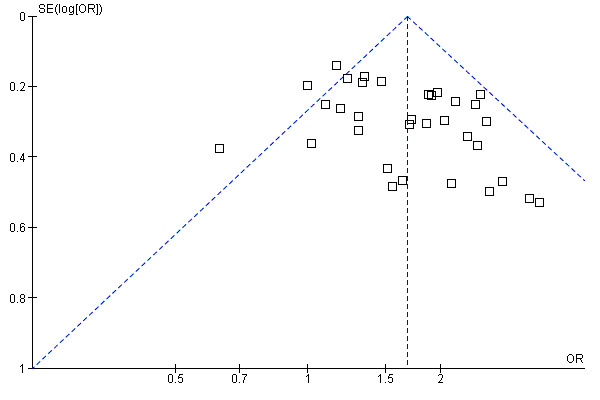
Funnel plot of comparison: 1 Studies on Recurrence, outcome: 1.1 All Studies.
2.
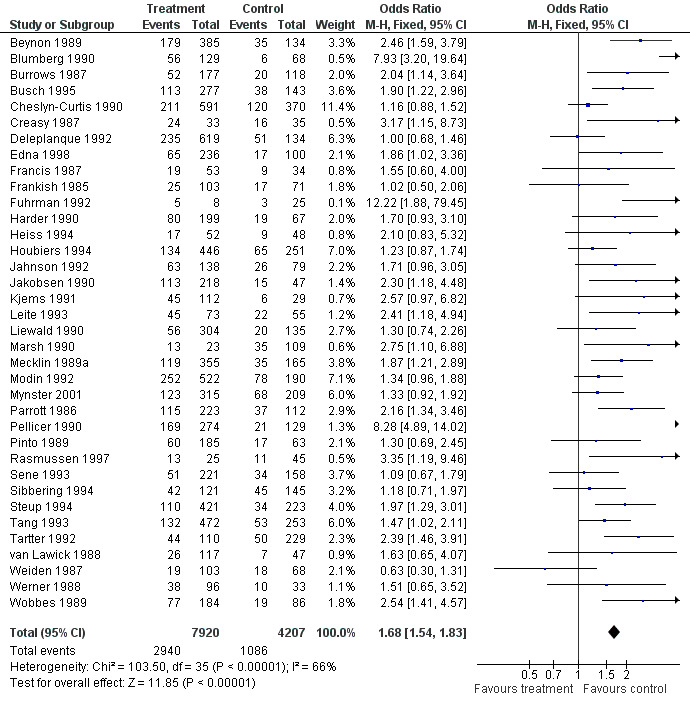
Forest plot of comparison: 1 Studies on Recurrence, outcome: 1.1 All Studies.
Sensitivity analyses were conducted to test the robustness of these estimates. Similar results were obtained when the analysis included only either the retrospective studies (OR=1.91; 95%CI, 1.71 to 2.13, Figure 3), or the studies with multivariable procedures (OR=1.71; 95%CI, 1.53 to 1.90, Figure 4). Interestingly, the inclusion of the studies with higher quality (OR=1.71; 95%CI, 1.46 to 2.01, Figure 5), or of the prospective studies (OR=1.36; 95%CI, 1.18 to 1.56), or of the randomised trials specifically designed to test the PBT effect (OR=1.65; 95%CI, 1.31 to 2.08, Figure 6), yielded similar and significant ORs, but with no significant heterogeneity .
3.
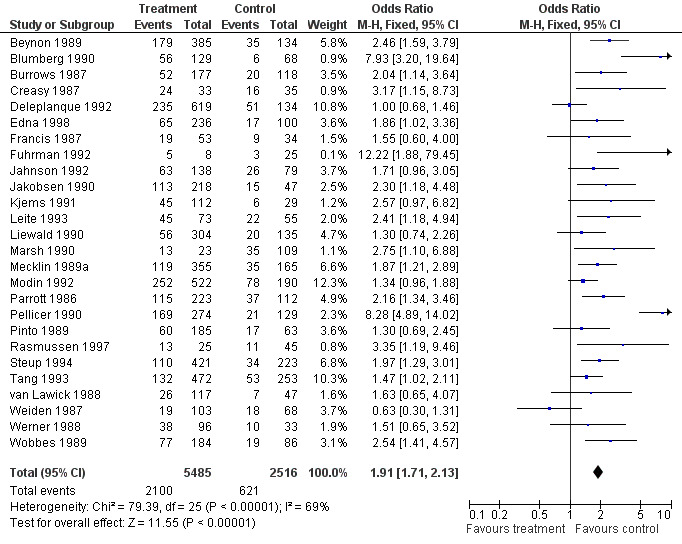
Forest plot of comparison: 1 Studies on Recurrence, outcome: 1.3 Retrospective Studies.
4.
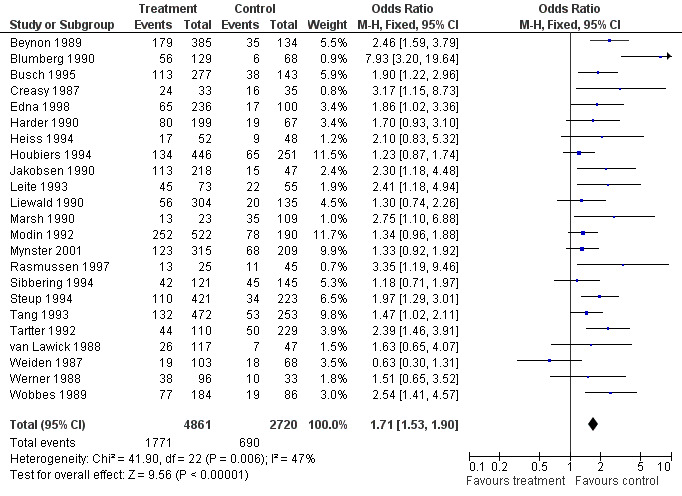
Forest plot of comparison: 1 Studies on Recurrence, outcome: 1.4 Multivariate Analysis.
5.
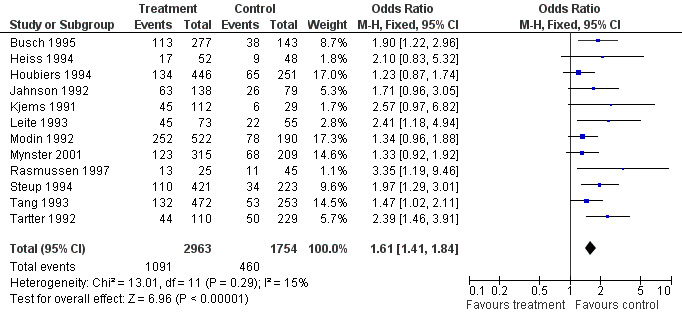
Forest plot of comparison: 1 Studies on Recurrence, outcome: 1.7 Top 25% Quality.
6.
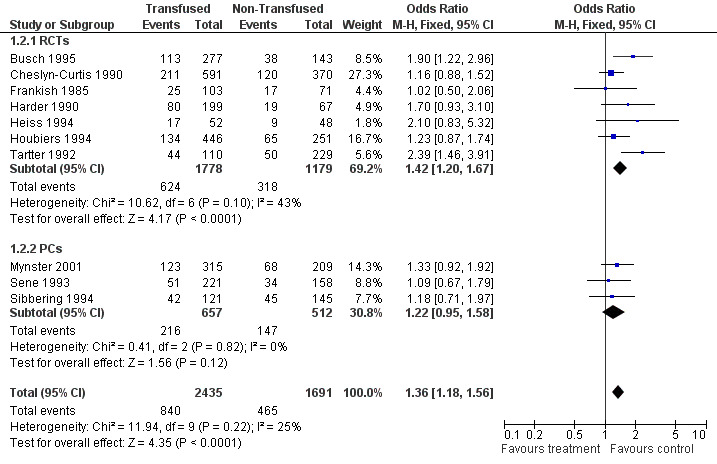
Forest plot of comparison: 1 Studies on Recurrence, outcome: 1.2 Prospective Studies and Randomized Controlled Studies.
Site and Stage of Disease Colonic tumors recurred in 31% of the cases, and in 11 studies showed pooled estimates similar to those computed in all studies (OR=1.64; 95%CI, 1.36 to 1.98). Information on rectal cancers was available in 12 studies, leading to a common OR larger than that obtained for colon cancers, and with no significant heterogeneity (OR=2.03; 95%CI, 1.61 to 2.57, Figure 7).
7.
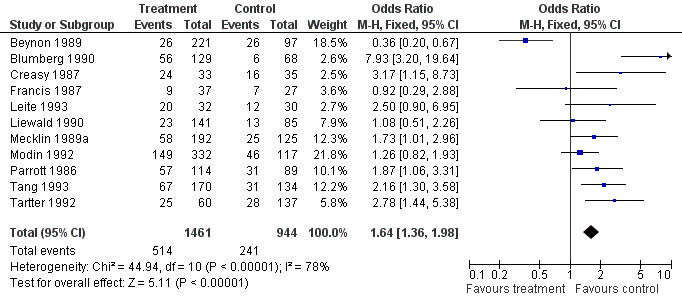
Forest plot of comparison: 1 Studies on Recurrence, outcome: 1.8 Colon Cancer.
Sixty‐one percent of patients with Astler‐Coller stage A‐B1‐2 were transfused, with an overall recurrence rate of 30% (OR=1.93; 95%CI, 1.58 to 2.37, Figure 8). Sixty‐eight percent of those with a more advanced stage received a transfusion, and showed an overall recurrence rate of 53% (OR=1.51; 95%CI, 1.18 to 1.92, Figure 9). Both these pooled ORs showed a significant heterogeneity across studies.
8.
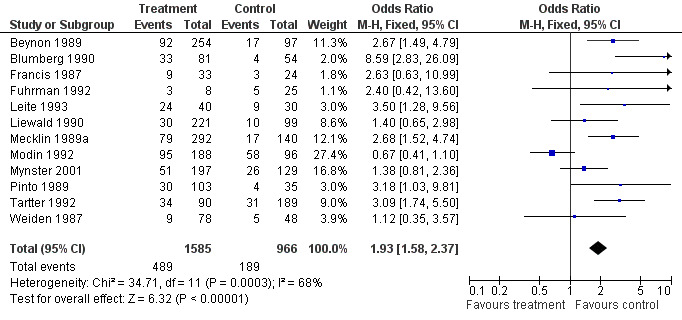
Forest plot of comparison: 1 Studies on Recurrence, outcome: 1.10 Dukes A‐B.
9.
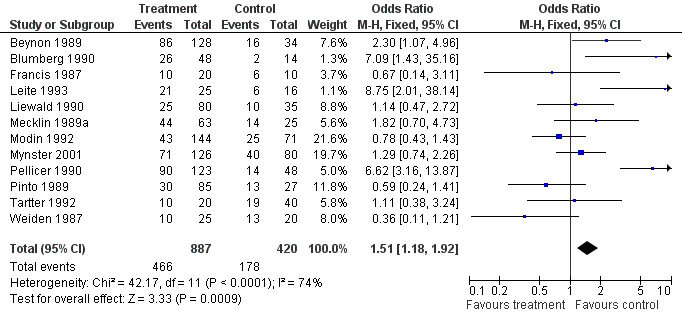
Forest plot of comparison: 1 Studies on Recurrence, outcome: 1.11 Dukes C.
Transfusion‐related risk factors The timing of PBT seemed not to affect the risk of recurrences. Pre‐operative data, obtained from five studies, showed an overall recurrence rate of 30% (Figure 10), similar to those computed for intra‐ and post‐operative transfusions (32% and 30%, respectively), derived from nine studies (Figure 11 and Figure 12).Their ORs were close to those obtained in all studies, and with no significant heterogeneity. Both red blood cells and whole blood were associated with an increased risk of recurrence. Seven (OR=1.65; 95%CI, 1.35 to 2.01, Figure 13) and five studies (OR=2.07; 95%CI, 1.55 to 2.76, Figure 14), respectively, contributed to this analysis, while data on plasma were present in one study only.
10.

Forest plot of comparison: 1 Studies on Recurrence, outcome: 1.12 Pre‐operative Transfusions.
11.
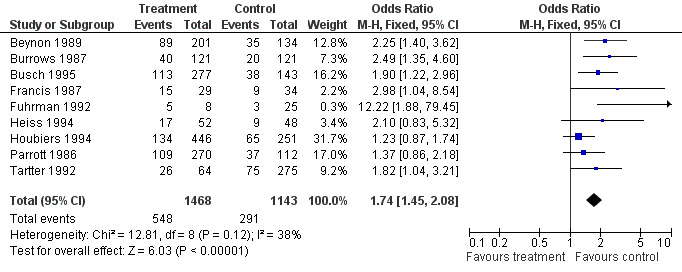
Forest plot of comparison: 1 Studies on Recurrence, outcome: 1.13 Intra‐operative Transfusions.
12.
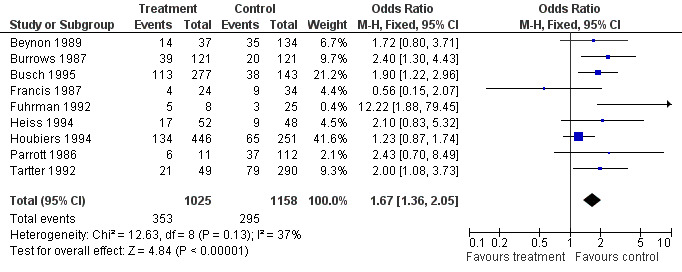
Forest plot of comparison: 1 Studies on Recurrence, outcome: 1.14 Post‐operative Transfusions.
13.
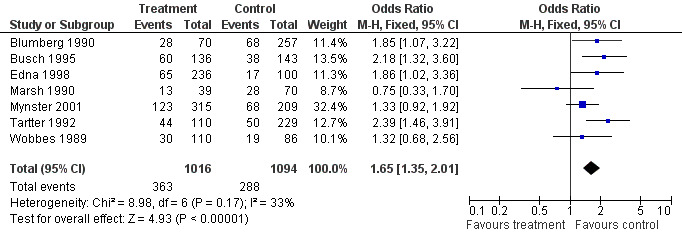
Forest plot of comparison: 1 Studies on Recurrence, outcome: 1.15 Red Blood Cells.
14.

Forest plot of comparison: 1 Studies on Recurrence, outcome: 1.16 Whole Blood.
Finally, increased risks were observed with an increased number of transfused units: one to two units showed an OR of 1.40 (95% CI, 1.18 to 1.67, Figure 15), which became 1.69 for three to four units (95% CI, 1.40 to 2.03, Figure 16), and 2.02 for five or more units (95% CI, 1.65 to 2.48, Figure 17). Significant heterogeneity was detected in these analyses.
15.
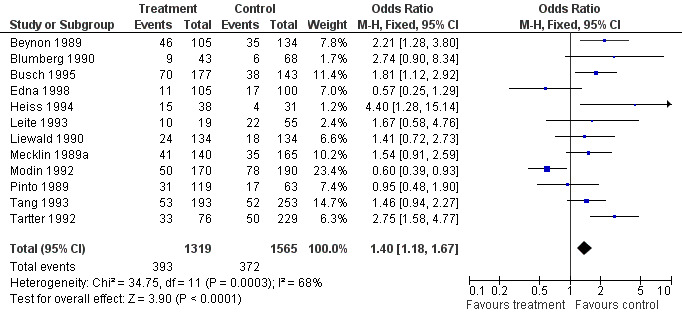
Forest plot of comparison: 1 Studies on Recurrence, outcome: 1.17 1‐2 Transfused Units.
16.
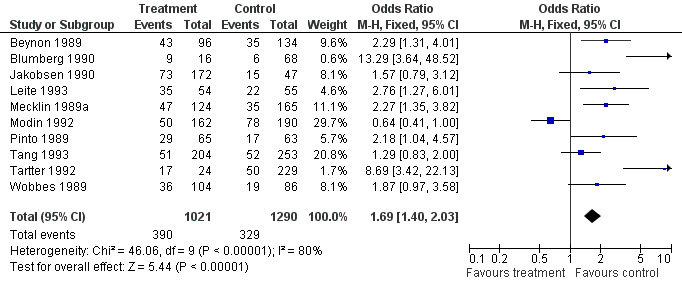
Forest plot of comparison: 1 Studies on Recurrence, outcome: 1.18 3‐4 Transfused Units.
17.
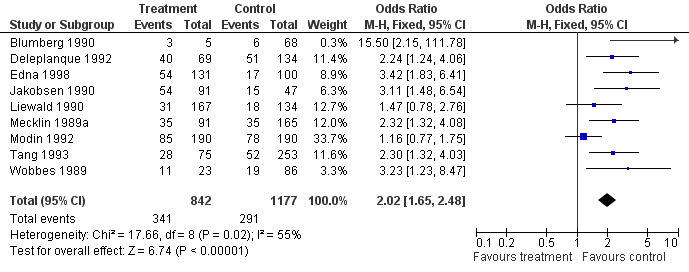
Forest plot of comparison: 1 Studies on Recurrence, outcome: 1.19 >=5 Transfused Units.
Surgery‐related risk factors The incompleteness of numerical data did not allow to stratify patients for factors such as seniority of surgeons, type of operation, duration of surgery, operative blood loss, or technical details, which could have helped to clarify the causal role of PBT in colorectal cancer recurrence.
Discussion
In the first study on the possible effect of PBT over recurrent colorectal cancer, the hypothesis made by the authors was that the immunosuppressive effect of blood transfusions, well established through its use in renal transplantation, could be extended to cancer patients (Burrows 1982). Blood transfusion effects in dialysis patients are now generally accepted and, although their exact mechanisms are still obscure (Nielsen 1995), a generalized suppression of cell‐mediated immunity has been suspected (Francis 1989, Waymack 1989, Blumberg 1989, Tartter 1988). However, the transient reduction in helper and suppressor cells that follows normal surgery is unlikely to be affected by blood transfusions, and, in cancer surgery, the postoperative depression of in vitro lymphocyte responses attributable to transfusions is not documented by all authors (Blumberg 1989). Studies with animal models might have contributed to a better understanding of the role of PBT on cancer growth but, unfortunately, they created more questions than answers, due to great differences in timing, route, tumors, species, and strains used (Marquet 1993; Jeekel 1995). Moreover, the specifically responsible blood component has not been identified: both red blood cells, white blood cells, and plasma have been involved (Francis 1981; Francis 1985, ). Finally, another debated issue refers to the questioned immunogenicity of tumors as opposed to allografts. In fact, they differ in terms of type and duration of antigen expression, and their comparability is therefore cast into doubt (Blumberg 1989).
With this background, many authors have investigated the relationship between the recurrence of some tumors and PBT (Tartter 1985; Vamvakas 1995), as well as factors affecting morbidity, mortality and survival for colorectal cancer patients (Lobaziewicz 2008; Macadam 2005). The greatest amount of research has been conducted on colorectal cancer, with respect to which this meta‐analysis has identified 36 original papers, widely differing in their designs, analysis, and results. Nearly two thirds of them, however, reported a significant detrimental effect of PBT on recurrent tumors. Furthermore, in almost all negative studies the inspection of both the observed difference and the power of the study itself should have led the authors to state that results were inconclusive, or that a type‐II error was possible: this was considered in only a few such papers (Francis 1987; Weiden 1987; Jakobsen 1990). In fact, in order to identify a difference of 15% with 80% certainty, and accepting a 5% significance level, one would need 226 to 275 patients, taking into account non‐cancer deaths and patients lost to follow‐up. In this respect, many studies had insufficient sample sizes. Therefore, their pooling substantially reduced the possibility of a beta‐error, and increased the likelihood of detecting small differences .
All these considerations, as well as the non conclusive evidence from the literature, have represented the rationale for the present meta‐analysis. Our results show a harmful transfusion effect, with overall odds of recurring 68% higher and rate difference 11% larger in transfused patents operated for colorectal cancer. These results are significant, and are consistent when examining only retrospective studies, or studies with multivariable analyses. However, significant heterogeneity was detected in these cases, thus confirming the wide differences in design and populations of the included studies. A further analysis was conducted including only the studies of higher quality, the prospective studies, or the specific RCTs: significant findings of the same magnitude in effects size were obtained in these cases, but without heterogeneity. Furthermore, all these results confirm our early reports (Amato 1998), and are also supported by the more recent findings by Chung et al. (Chung 1993) and by Vamvakas et al. (Vamvakas 1993), derived from a smaller number of trials (n=8 and 9, respectively). In particular, the pooled estimate obtained by Vamvakas et al. in their first "qualitative" meta‐analysis (OR=1.37, 35b) is similar to our estimate when only prospective studies are taken into account, and their subsequent meta‐analysis for explanation showed an overall unadjusted relative risk for colorectal cancer recurrence of 1.50 (95%CI, 1.18 to1.90) in 15 studies, being 1.18 (95%CI, 0.93 to 1.51) in seven prospective studies, and 1.68 (95%CI, 1.35 to 2.08) in 16 studies with regression analyses. The authors concluded that a possible effect of confounding could not completely explain the unadjusted transfusion effect (Vamvakas 1995).
Particularly interesting are the results of the four specific randomised controlled trials, which have been performed recently with the specific aim of verifying the detrimental association between allogenic PBT and colorectal cancer recurrence (Tartter 1992; Busch 1995; Heiss 1994; Houbiers 1994). The first study, designed to use allogenic packed red cells in the transfusion arm as opposed to no transfusions, showed a detrimental effect of PBT, with a two and half risk of recurring for transfused patients (Tartter 1992). The other three studies compared autologous to allogenic blood. Among them, that by Heiss et al. showed a two times bigger risk of recurrence with transfusions, although their 95%CI were not significant (Heiss 1994). Busch et al. highlighted a detrimental effect of allogenic transfusions (OR=1.85, 95%CI 1.22 to 2.82), although they attributed the increased transfusion risk to the conditions necessitating the transfusions, more than to PBT per se (Busch 1995). Finally, Houbiers et al. showed a non significant effect of PBT on recurrence (OR=1.23, 95%CI 0.87 to 1.73) but, surprisingly, they found a difference in survival in favour of non‐transfused patients (Houbiers 1994). The conclusions of both the latter studies, however, have raised some questions, related not only to a relatively large proportion of patients receiving allogenic blood even in the autologous arm, but also to other methodological issues. The pooled PBT effect computed in these studies was in accordance with that observed overall, but without significant heterogeneity. It has to be underlined that none of the RCTs could randomise between transfusion and no‐transfusion.
A meaningful interpretation of our results was also achieved by considering PBT effect over recurrence in patients stratified by known prognostic factors. With regard to tumor site, both rectal and colon cancers confirmed a detrimental effect of PBT, in contrast with one conclusion of Vamvakas et al. (Vamvakas 1993). Rectal cancers, which were transfused more often than colon cancers, showed a higher risk of recurring, with an approximately twofold increase in their odds. Colonic cancers showed a lower recurrence risk when given PBT, and this might be further impacted by the increasing adoption of adjuvant chemotherapy regimens. As far as the different tumor stages were concerned, a significant PBT effect was confirmed consistently throughout, although with significant heterogeneity across studies. This effect was less evident in the advanced C stage, where it was probably masked by the concomitant negative effect of advanced disease, known as the major cause of recurrent colorectal cancer, and weighting more than transfusion as an independent prognostic factor in all multivariable analyses examined.
Our results were also stratified according to other prognostic factors that could have been independently associated with blood transfusions and cancer recurrence. These included variables such as preoperative anaemia, duration of operations, volume of blood loss, as well as amount, type and timing of PBT, which have been linked to depressed immune response and early cancer recurrence. These analyses could have helped to clarify whether transfusion was simply a "proxy variable", that is a variable reaching statistical significance despite any lack of causality with recurrence. In fact, transfusions could simply be an index of "nasty" tumors, which cause severe anaemia and are at increased risk of recurring, more than a direct cause of recurrence per se.
The analyses involving transfusion‐related factors showed that recurrences were more likely with transfusions independent of their timing, and the type of blood product used. They also showed a dose‐dependent relationship, with three or more units of transfused blood almost doubling the risk observed with one or two units. It has to be stressed that some heterogeneity was detected in these studies, and that these areas could be explored only in part, due to absent or unclear definitions for the type of blood used, and to the absence of specific data for the timing of PBT. No data were available to fully elucidate the effect of leukocyte depletion on recurrence.
Finally, none of the analyses considering surgical trauma or operative techniques could be carried out. A definition of these factors, which could have better clarified a possible cause‐effect mechanism, was seldom given and only a few papers presented data to allow meaningful comparisons. In particular, it was impossible to address the complete removal of the mesorectum in the case of rectal cancer (a common practice these days, which might require more blood transfusions but achieve better local tumor control), as well as the possible differences related to number and seniority of the involved surgeons, issues that could have explained many differences in the reported recurrence rates.
Authors' conclusions
Implications for practice.
The additional evidence published up to Decemeber 2009, when integrated with the previous data, confirms the previous conclusion of a moderate association between PBT and an increased risk of recurrence in colorectal cancer patients operated for cure. This still proves valid in both colon and rectal cancers, for early and advanced tumor stages, and most likely occurs in a dose‐dependent way, regardless of the timing and type of the transfused blood. Because of the important implications of these implications, carefully restricted indications for PBT should be considered in colorectal cancer patients undergoing curative surgery.
Implications for research.
The above conclusion should represent the working hypothesis for future clinical trials, whose great challenge will be to control also for surgical procedures, quality and type of the blood to administer, target hematocrit, and concomitant use of immunomodulators or adjuvant chemotherapy.
What's new
| Date | Event | Description |
|---|---|---|
| 1 November 2010 | New search has been performed | Results updated to reflect the updated search to December 2009 |
History
Protocol first published: Issue 4, 2004 Review first published: Issue 1, 2006
| Date | Event | Description |
|---|---|---|
| 5 August 2008 | Amended | Converted to new review format. |
| 13 November 2005 | New citation required and conclusions have changed | Substantive amendment |
Acknowledgements
We acknowledge the support of the Cochrane Colorectal Cancer Group in the planning, conducting and reporting of this systematic review.
Data and analyses
Comparison 1. Studies on Recurrence.
| Outcome or subgroup title | No. of studies | No. of participants | Statistical method | Effect size |
|---|---|---|---|---|
| 1 All Studies | 36 | 12127 | Odds Ratio (M‐H, Fixed, 95% CI) | 1.68 [1.54, 1.83] |
| 2 Prospective Studies | 10 | 4126 | Odds Ratio (M‐H, Fixed, 95% CI) | 1.36 [1.18, 1.56] |
| 2.1 RCTs | 7 | 2957 | Odds Ratio (M‐H, Fixed, 95% CI) | 1.42 [1.20, 1.67] |
| 2.2 PCs | 3 | 1169 | Odds Ratio (M‐H, Fixed, 95% CI) | 1.22 [0.95, 1.58] |
| 3 Retrospective Studies | 26 | 8001 | Odds Ratio (M‐H, Fixed, 95% CI) | 1.91 [1.71, 2.13] |
| 4 Multivariate Analysis | 23 | 7581 | Odds Ratio (M‐H, Fixed, 95% CI) | 1.71 [1.53, 1.90] |
| 5 RCTs/PCs | 10 | 4126 | Odds Ratio (M‐H, Fixed, 95% CI) | 1.36 [1.18, 1.56] |
| 6 Specific RCTs | 4 | 1556 | Odds Ratio (M‐H, Fixed, 95% CI) | 1.65 [1.31, 2.08] |
| 7 Top 25% Quality | 12 | 4717 | Odds Ratio (M‐H, Fixed, 95% CI) | 1.61 [1.41, 1.84] |
| 8 Colon Cancer | 11 | 2405 | Odds Ratio (M‐H, Fixed, 95% CI) | 1.64 [1.36, 1.98] |
| 9 Rectal Cancer | 12 | 1963 | Odds Ratio (M‐H, Fixed, 95% CI) | 2.03 [1.61, 2.57] |
| 10 Dukes A‐B | 12 | 2551 | Odds Ratio (M‐H, Fixed, 95% CI) | 1.93 [1.58, 2.37] |
| 11 Dukes C | 12 | 1307 | Odds Ratio (M‐H, Fixed, 95% CI) | 1.51 [1.18, 1.92] |
| 12 Pre‐operative Transfusions | 5 | 1123 | Odds Ratio (M‐H, Fixed, 95% CI) | 1.50 [1.10, 2.06] |
| 13 Intra‐operative Transfusions | 9 | 2611 | Odds Ratio (M‐H, Fixed, 95% CI) | 1.74 [1.45, 2.08] |
| 14 Post‐operative Transfusions | 9 | 2183 | Odds Ratio (M‐H, Fixed, 95% CI) | 1.67 [1.36, 2.05] |
| 15 Red Blood Cells | 7 | 2110 | Odds Ratio (M‐H, Fixed, 95% CI) | 1.65 [1.35, 2.01] |
| 16 Whole Blood | 5 | 1014 | Odds Ratio (M‐H, Fixed, 95% CI) | 2.07 [1.55, 2.76] |
| 17 1‐2 Transfused Units | 12 | 2884 | Odds Ratio (M‐H, Fixed, 95% CI) | 1.40 [1.18, 1.67] |
| 18 3‐4 Transfused Units | 10 | 2311 | Odds Ratio (M‐H, Fixed, 95% CI) | 1.69 [1.40, 2.03] |
| 19 >=5 Transfused Units | 9 | 2019 | Odds Ratio (M‐H, Fixed, 95% CI) | 2.02 [1.65, 2.48] |
1.1. Analysis.
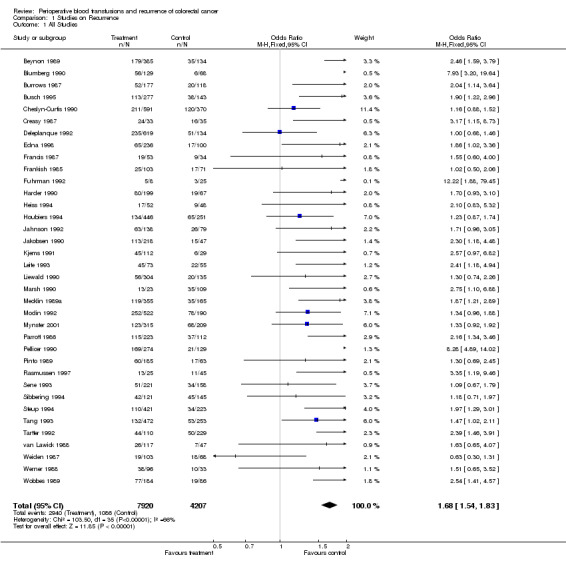
Comparison 1 Studies on Recurrence, Outcome 1 All Studies.
1.2. Analysis.
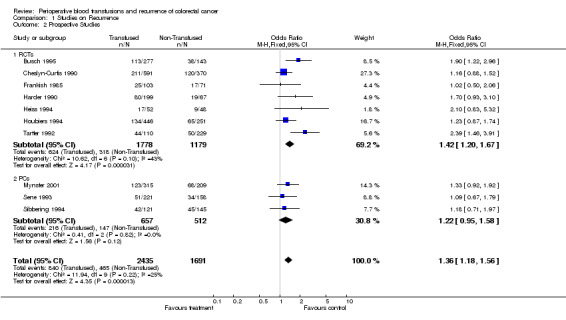
Comparison 1 Studies on Recurrence, Outcome 2 Prospective Studies.
1.3. Analysis.
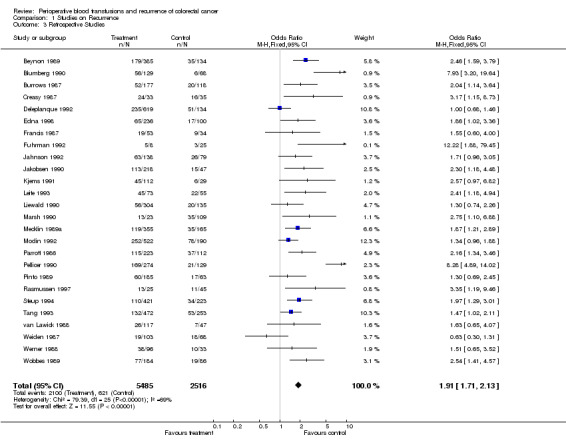
Comparison 1 Studies on Recurrence, Outcome 3 Retrospective Studies.
1.4. Analysis.
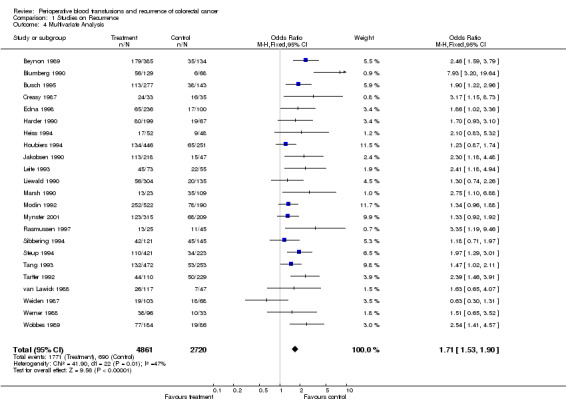
Comparison 1 Studies on Recurrence, Outcome 4 Multivariate Analysis.
1.5. Analysis.
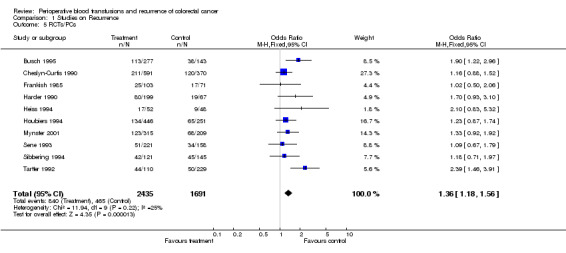
Comparison 1 Studies on Recurrence, Outcome 5 RCTs/PCs.
1.6. Analysis.

Comparison 1 Studies on Recurrence, Outcome 6 Specific RCTs.
1.7. Analysis.
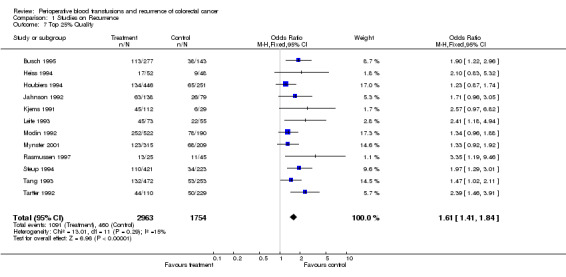
Comparison 1 Studies on Recurrence, Outcome 7 Top 25% Quality.
1.8. Analysis.
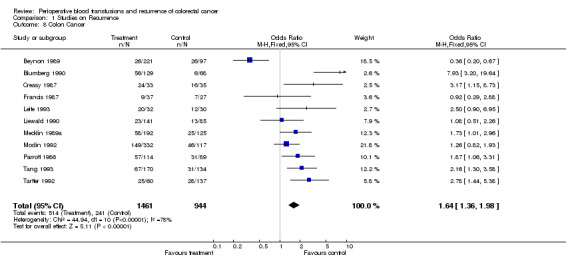
Comparison 1 Studies on Recurrence, Outcome 8 Colon Cancer.
1.9. Analysis.
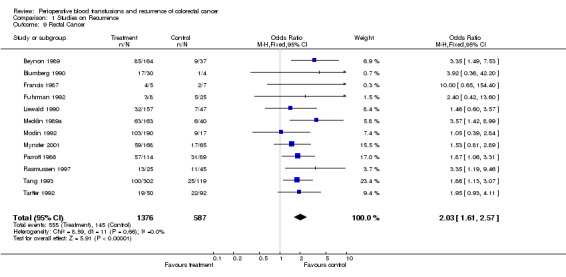
Comparison 1 Studies on Recurrence, Outcome 9 Rectal Cancer.
1.10. Analysis.
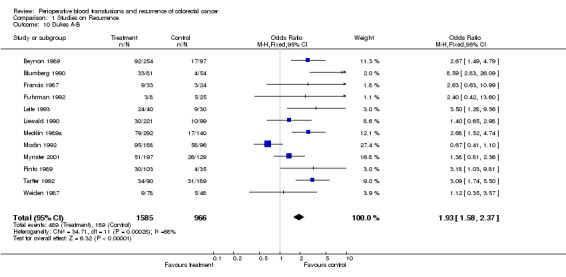
Comparison 1 Studies on Recurrence, Outcome 10 Dukes A‐B.
1.11. Analysis.
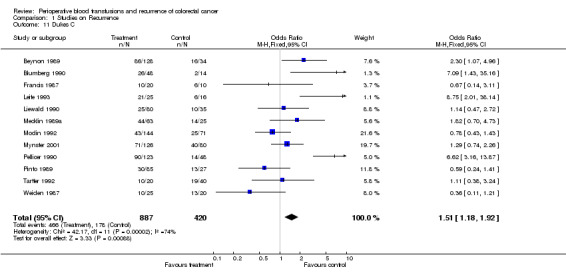
Comparison 1 Studies on Recurrence, Outcome 11 Dukes C.
1.12. Analysis.
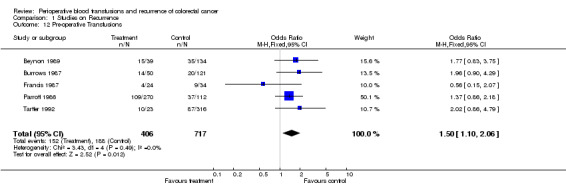
Comparison 1 Studies on Recurrence, Outcome 12 Pre‐operative Transfusions.
1.13. Analysis.
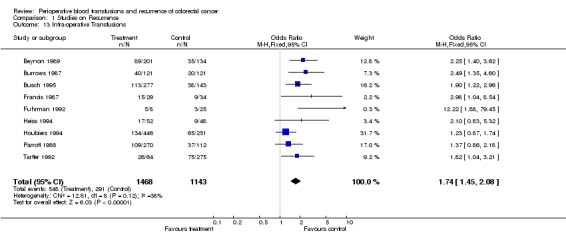
Comparison 1 Studies on Recurrence, Outcome 13 Intra‐operative Transfusions.
1.14. Analysis.
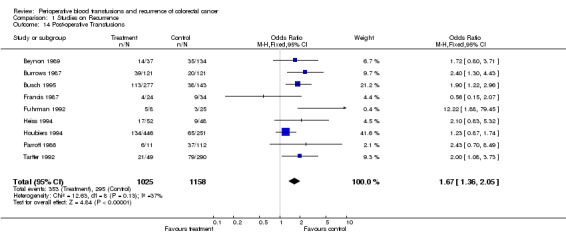
Comparison 1 Studies on Recurrence, Outcome 14 Post‐operative Transfusions.
1.15. Analysis.
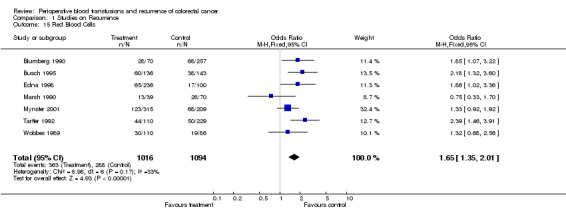
Comparison 1 Studies on Recurrence, Outcome 15 Red Blood Cells.
1.16. Analysis.
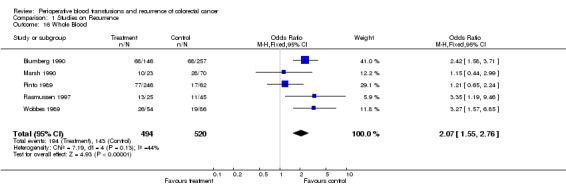
Comparison 1 Studies on Recurrence, Outcome 16 Whole Blood.
1.17. Analysis.
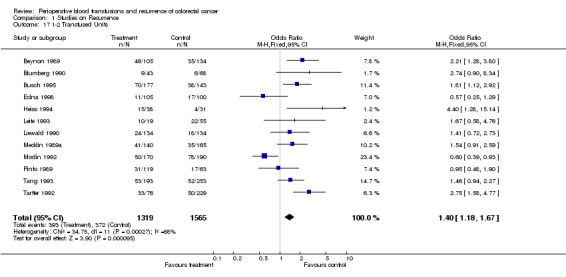
Comparison 1 Studies on Recurrence, Outcome 17 1‐2 Transfused Units.
1.18. Analysis.
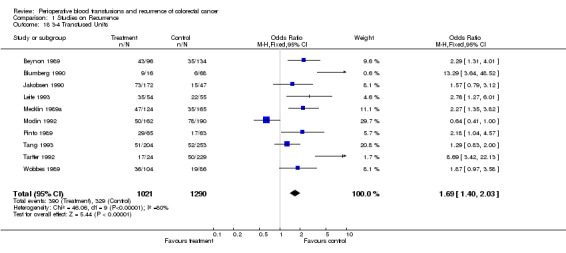
Comparison 1 Studies on Recurrence, Outcome 18 3‐4 Transfused Units.
1.19. Analysis.
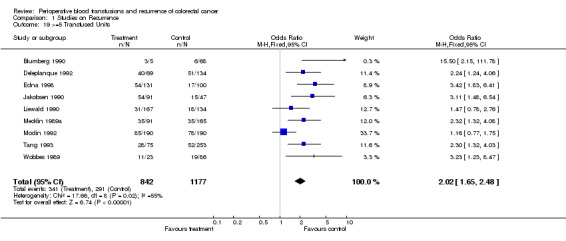
Comparison 1 Studies on Recurrence, Outcome 19 >=5 Transfused Units.
Characteristics of studies
Characteristics of included studies [ordered by study ID]
Beynon 1989.
| Methods | Retrospective Study | |
| Participants | 519 Dukes A‐C, colorectal cancer patients | |
| Interventions | 74.2% perioperative transfusions | |
| Outcomes | recurrence rate | |
| Notes | Log‐linear model used | |
| Risk of bias | ||
| Bias | Authors' judgement | Support for judgement |
| Allocation concealment? | Unclear risk | D ‐ Not used |
Blumberg 1990.
| Methods | Retrospective Study | |
| Participants | 197 Dukes A‐C2, colorectal cancer patients | |
| Interventions | 65.5% perioperative transfusions (whole blood, packed red cells) | |
| Outcomes | recurrence rate | |
| Notes | Cox regression used | |
| Risk of bias | ||
| Bias | Authors' judgement | Support for judgement |
| Allocation concealment? | Unclear risk | D ‐ Not used |
Burrows 1987.
| Methods | Retrospective Study | |
| Participants | 295 Dukes B2‐C2, colorectal cancer patients | |
| Interventions | 60.0% perioperative transfusions | |
| Outcomes | disease‐free survival | |
| Notes | ||
| Risk of bias | ||
| Bias | Authors' judgement | Support for judgement |
| Allocation concealment? | Unclear risk | D ‐ Not used |
Busch 1995.
| Methods | Randomized Controlled Trial | |
| Participants | 423 Dukes A‐C, colorectal cancer patients | |
| Interventions | 66.0% intra‐ and postoperative transfusions (allogenic and autologous) | |
| Outcomes | recurrence rate | |
| Notes | Cox regression used | |
| Risk of bias | ||
| Bias | Authors' judgement | Support for judgement |
| Allocation concealment? | Low risk | A ‐ Adequate |
Cheslyn‐Curtis 1990.
| Methods | Randomized Controlled Trial | |
| Participants | 961 Dukes A‐C, colorectal cancer patients | |
| Interventions | 61.5% perioperative transfusions | |
| Outcomes | recurrence rate | |
| Notes | ||
| Risk of bias | ||
| Bias | Authors' judgement | Support for judgement |
| Allocation concealment? | Low risk | A ‐ Adequate |
Creasy 1987.
| Methods | Retrospective Study | |
| Participants | 68 Dukes A‐C, sigmoid cancer patients | |
| Interventions | 48.5% perioperative transfusions | |
| Outcomes | disease‐free survival | |
| Notes | Cox regression used | |
| Risk of bias | ||
| Bias | Authors' judgement | Support for judgement |
| Allocation concealment? | Unclear risk | D ‐ Not used |
Deleplanque 1992.
| Methods | Retrospective Study | |
| Participants | 753 Dukes B‐C, colorectal cancer patients | |
| Interventions | 82.2% perioperative transfusions | |
| Outcomes | disease‐free survival | |
| Notes | ||
| Risk of bias | ||
| Bias | Authors' judgement | Support for judgement |
| Allocation concealment? | Unclear risk | D ‐ Not used |
Edna 1998.
| Methods | Retrospective Study | |
| Participants | 336 Dukes A‐C, colorectal cancer patients | |
| Interventions | 70% perioperative transfusions | |
| Outcomes | recurrence‐free survival overall survival cancer survival | |
| Notes | ||
| Risk of bias | ||
| Bias | Authors' judgement | Support for judgement |
| Allocation concealment? | Unclear risk | D ‐ Not used |
Francis 1987.
| Methods | Retrospective Study | |
| Participants | 87 Dukes A‐C, colorectal cancer patients | |
| Interventions | 60.9% perioperative transfusions | |
| Outcomes | recurrence rate | |
| Notes | ||
| Risk of bias | ||
| Bias | Authors' judgement | Support for judgement |
| Allocation concealment? | Unclear risk | D ‐ Not used |
Frankish 1985.
| Methods | Randomized Controlled Trial | |
| Participants | 174 Dukes A‐C, colorectal cancer patients | |
| Interventions | 59.2% perioperative transfusions | |
| Outcomes | recurrence rate | |
| Notes | ||
| Risk of bias | ||
| Bias | Authors' judgement | Support for judgement |
| Allocation concealment? | Low risk | A ‐ Adequate |
Fuhrman 1992.
| Methods | Retrospective Study | |
| Participants | 33 Dukes B‐C, rectal cancer patients | |
| Interventions | 24.2% intra‐ and post‐operative transfusions | |
| Outcomes | recurrence rate | |
| Notes | ||
| Risk of bias | ||
| Bias | Authors' judgement | Support for judgement |
| Allocation concealment? | Unclear risk | D ‐ Not used |
Harder 1990.
| Methods | Randomized Controlled Trial | |
| Participants | 266 Dukes A‐C, colorectal cancer patients | |
| Interventions | 74.8% perioperative transfusions | |
| Outcomes | recurrence rate | |
| Notes | Cox regression used | |
| Risk of bias | ||
| Bias | Authors' judgement | Support for judgement |
| Allocation concealment? | Low risk | A ‐ Adequate |
Heiss 1994.
| Methods | Randomized Controlled Trial | |
| Participants | 100 Dukes A‐C, colorectal cancer patients | |
| Interventions | 52.0% intra‐ and post‐operative transfusions (allogenic and autologous) | |
| Outcomes | recurrence rate disease‐free survival | |
| Notes | Cox regression used | |
| Risk of bias | ||
| Bias | Authors' judgement | Support for judgement |
| Allocation concealment? | Low risk | A ‐ Adequate |
Houbiers 1994.
| Methods | Randomized Controlled Trial | |
| Participants | 697 Dukes A‐C2, colorectal cancer patients | |
| Interventions | 64.0% intra‐ and post‐operative transfusions (leukocyte‐depleted packed cells) | |
| Outcomes | recurrence rate disease‐free survival | |
| Notes | Cox regression used | |
| Risk of bias | ||
| Bias | Authors' judgement | Support for judgement |
| Allocation concealment? | Low risk | A ‐ Adequate |
Jahnson 1992.
| Methods | Retrospective Study | |
| Participants | 217 Dukes B‐C, colorectal cancer patients | |
| Interventions | 63.6% perioperative transfusions (whole blood, packed red cells) | |
| Outcomes | recurrence rate | |
| Notes | ||
| Risk of bias | ||
| Bias | Authors' judgement | Support for judgement |
| Allocation concealment? | Unclear risk | D ‐ Not used |
Jakobsen 1990.
| Methods | Retrospective Study | |
| Participants | 265 Dukes A‐C, colorectal cancer patients | |
| Interventions | 82.3% perioperative transfusions | |
| Outcomes | recurrence rate | |
| Notes | Cox regression used | |
| Risk of bias | ||
| Bias | Authors' judgement | Support for judgement |
| Allocation concealment? | Unclear risk | D ‐ Not used |
Kjems 1991.
| Methods | Retrospective Study | |
| Participants | 141 Dukes B‐C, colorectal cancer patients | |
| Interventions | 74.9% perioperative transfusions | |
| Outcomes | recurrence rate | |
| Notes | ||
| Risk of bias | ||
| Bias | Authors' judgement | Support for judgement |
| Allocation concealment? | Unclear risk | D ‐ Not used |
Leite 1993.
| Methods | Retrospective Study | |
| Participants | 128 Dukes A‐C, colorectal cancer patients | |
| Interventions | 57.0% perioperative transfusions (whole blood, packed red cells, plasma) | |
| Outcomes | disease‐free survival | |
| Notes | Cox regression used | |
| Risk of bias | ||
| Bias | Authors' judgement | Support for judgement |
| Allocation concealment? | Unclear risk | D ‐ Not used |
Liewald 1990.
| Methods | Retrospective Study | |
| Participants | 439 Dukes A‐C, colorectal cancer patients | |
| Interventions | 69.2% perioperative transfusions (whole blood, packed red cells) | |
| Outcomes | recurrence rate | |
| Notes | Logistic regression used | |
| Risk of bias | ||
| Bias | Authors' judgement | Support for judgement |
| Allocation concealment? | Unclear risk | D ‐ Not used |
Marsh 1990.
| Methods | Retrospective Study | |
| Participants | 132 Dukes B‐C, colorectal cancer patients | |
| Interventions | 17.4% perioperative transfusions (whole blood, packed red cells, plasma) | |
| Outcomes | recurrence rate | |
| Notes | Cox regression used | |
| Risk of bias | ||
| Bias | Authors' judgement | Support for judgement |
| Allocation concealment? | Unclear risk | D ‐ Not used |
Mecklin 1989a.
| Methods | Retrospective Study | |
| Participants | 520 Dukes A‐C, colorectal cancer patients | |
| Interventions | 68.3% perioperative transfusions | |
| Outcomes | recurrence rate | |
| Notes | ||
| Risk of bias | ||
| Bias | Authors' judgement | Support for judgement |
| Allocation concealment? | Unclear risk | D ‐ Not used |
Modin 1992.
| Methods | Retrospective Study | |
| Participants | 712 Dukes B‐C, colorectal cancer patients | |
| Interventions | 73.3% perioperative transfusions (whole blood, packed red cells, plasma) | |
| Outcomes | recurrence rate | |
| Notes | Poisson regression used | |
| Risk of bias | ||
| Bias | Authors' judgement | Support for judgement |
| Allocation concealment? | Unclear risk | D ‐ Not used |
Mynster 2001.
| Methods | Prospective Cohort (within a Randomized Trial) | |
| Participants | 524 Dukes A‐C, colorectal cancer patients | |
| Interventions | 60% perioperative RBC (SAM‐G) transfusions | |
| Outcomes | recurrence rate survival | |
| Notes | Cox regression and Logistic regression used | |
| Risk of bias | ||
| Bias | Authors' judgement | Support for judgement |
| Allocation concealment? | Low risk | A ‐ Adequate |
Parrott 1986.
| Methods | Retrospective Study | |
| Participants | 335 Dukes A‐C, colorectal cancer patients | |
| Interventions | 66.6% perioperative transfusions | |
| Outcomes | recurrence rate | |
| Notes | ||
| Risk of bias | ||
| Bias | Authors' judgement | Support for judgement |
| Allocation concealment? | Unclear risk | D ‐ Not used |
Pellicer 1990.
| Methods | Retrospective Study | |
| Participants | 403 Dukes B‐C, colorectal cancer patients | |
| Interventions | 68.0% perioperative transfusions | |
| Outcomes | recurrence rate | |
| Notes | ||
| Risk of bias | ||
| Bias | Authors' judgement | Support for judgement |
| Allocation concealment? | Unclear risk | D ‐ Not used |
Pinto 1989.
| Methods | Retrospective Study | |
| Participants | 248 Dukes A‐C1, colorectal cancer patients | |
| Interventions | 74.6% perioperative transfusions (whole blood, packed red cells) | |
| Outcomes | recurrence rate | |
| Notes | ||
| Risk of bias | ||
| Bias | Authors' judgement | Support for judgement |
| Allocation concealment? | Unclear risk | D ‐ Not used |
Rasmussen 1997.
| Methods | Retrospective Study | |
| Participants | 70 Dukes A‐C rectal cancer patients | |
| Interventions | 36% perioperative transfusions (whole blood in SAMG) | |
| Outcomes | recurrence rate | |
| Notes | Logistic regression on recurrence rate | |
| Risk of bias | ||
| Bias | Authors' judgement | Support for judgement |
| Allocation concealment? | Unclear risk | D ‐ Not used |
Sene 1993.
| Methods | Prospective Cohort | |
| Participants | 379 Dukes A‐C, colorectal cancer patients | |
| Interventions | 58.3% perioperative transfusions | |
| Outcomes | recurrence rate | |
| Notes | ||
| Risk of bias | ||
| Bias | Authors' judgement | Support for judgement |
| Allocation concealment? | Low risk | A ‐ Adequate |
Sibbering 1994.
| Methods | Prospective Cohort | |
| Participants | 266 Dukes A‐C, colorectal cancer patients | |
| Interventions | 45.5% perioperative transfusions | |
| Outcomes | disease‐free survival | |
| Notes | Cox regression used | |
| Risk of bias | ||
| Bias | Authors' judgement | Support for judgement |
| Allocation concealment? | Low risk | A ‐ Adequate |
Steup 1994.
| Methods | Retrospective Study | |
| Participants | 644 Dukes A‐C, colorectal cancer patients | |
| Interventions | 65.4% perioperative transfusions (whole blood, packed red cells) | |
| Outcomes | recurrence rate | |
| Notes | Cox regression used | |
| Risk of bias | ||
| Bias | Authors' judgement | Support for judgement |
| Allocation concealment? | Unclear risk | D ‐ Not used |
Tang 1993.
| Methods | Retrospective Study | |
| Participants | 725 Dukes B‐C, colorectal cancer patients | |
| Interventions | 65.1% perioperative transfusions (whole blood, packed red cells, plasma) | |
| Outcomes | recurrence rate | |
| Notes | Cox regression used | |
| Risk of bias | ||
| Bias | Authors' judgement | Support for judgement |
| Allocation concealment? | Unclear risk | D ‐ Not used |
Tartter 1992.
| Methods | Randomized Controlled Trial | |
| Participants | 339 Dukes A‐C2, colorectal cancer patients | |
| Interventions | 34.2% perioperative transfusions (packed red cells) | |
| Outcomes | recurrence rate | |
| Notes | Cox regression used | |
| Risk of bias | ||
| Bias | Authors' judgement | Support for judgement |
| Allocation concealment? | Low risk | A ‐ Adequate |
van Lawick 1988.
| Methods | Retrospective Study | |
| Participants | 164 Dukes A‐C, colorectal cancer patients | |
| Interventions | 71.3% perioperative transfusions (whole blood, packed red cells) | |
| Outcomes | disease‐free survival | |
| Notes | Cox regression used | |
| Risk of bias | ||
| Bias | Authors' judgement | Support for judgement |
| Allocation concealment? | Unclear risk | D ‐ Not used |
Weiden 1987.
| Methods | Retrospective Study | |
| Participants | 171 Dukes A‐C2, colorectal cancer patients | |
| Interventions | 60.2% perioperative transfusions (whole blood, packed red cells) | |
| Outcomes | recurrence rate | |
| Notes | Cox regression used | |
| Risk of bias | ||
| Bias | Authors' judgement | Support for judgement |
| Allocation concealment? | Unclear risk | D ‐ Not used |
Werner 1988.
| Methods | Retrospective Study | |
| Participants | 129 Dukes A‐D, colorectal cancer patients | |
| Interventions | 74.4% perioperative transfusions (type?) | |
| Outcomes | recurrence‐free survival | |
| Notes | Cox regression used. Dukes D present in 3 pts (2 rectal ca.) | |
| Risk of bias | ||
| Bias | Authors' judgement | Support for judgement |
| Allocation concealment? | Unclear risk | D ‐ Not used |
Wobbes 1989.
| Methods | Retrospective Study | |
| Participants | 270 Dukes A‐C, colorectal cancer patients | |
| Interventions | 68.1% perioperative transfusions (whole blood, packed red cells) | |
| Outcomes | disease‐free survival | |
| Notes | Cox regression used | |
| Risk of bias | ||
| Bias | Authors' judgement | Support for judgement |
| Allocation concealment? | Unclear risk | D ‐ Not used |
Characteristics of excluded studies [ordered by study ID]
| Study | Reason for exclusion |
|---|---|
| Akyol 1992 | No data |
| Altomare 1995 | No data |
| Amato 1994 | No data (letter) |
| Amato 2006 | Review |
| Ambiru 1999 | No data (liver mets) |
| Andreu 1996 | Review |
| Apolone 1990 | Review |
| Araujo SE | No data |
| Arnoux 1988 | Repetitive |
| Auer 2000 | No data (carcinoid) |
| Aufeuvre 1994 | Review |
| Bachoo 2000 | No data |
| Barbatzas 1996 | No data |
| Basili 2008 | No data |
| Benevento 2000 | No data (mets) |
| Benoist 2001 | No data on recurrence rates |
| Bentzen 1990 | Survival |
| Bjerrum 2006 | Review |
| Blair 1985 | Survival |
| Blajchman 1998 | Review |
| Blumberg 1985 | Repetitive |
| Blumberg 1986 | Repetitive |
| Blumberg 1987 | Review |
| Blumberg 1988 | Repetitive |
| Blumberg 1989 | Review |
| Blumberg 1990a | Review |
| Blumberg 1993 | No data (letter) |
| Blumberg 1994 | No data (letter) |
| Blumberg 1994a | Review |
| Blumberg 1995 | No data (letter) |
| Blumberg Agarwal 83 | Repetitive |
| Bock 1990 | No data (laringeal ca.) |
| Bordin 1995 | Review |
| Braga 1995 | No data |
| Bristow 2003 | No data |
| Brivio 1993 | No data |
| Browning 2009 | No data |
| Buell 2001 | No data (liver mets) |
| Bulow 2001 | No data |
| Burdy 2001 | No data |
| Burrows 1982 | Repetitive |
| Burrows 1983 | Repetitive |
| Busch 1992 | Repetitive |
| Busch 1993 | Repetitive |
| Busch 1993a | No data (letter) |
| Busch 1993b | Repetitive |
| Busch 1994 | Repetitive |
| Busch 1994a | Review |
| Busch 1995a | Repetitive, letter |
| Cady 1992 | No data (liver mets) |
| Ceelen 1996 | No data (mets) |
| Cheslyn‐Curtiss 1988 | Repetitive |
| Chiarugi 1996 | Repetitive |
| Chiarugi 2000 | No data (adjuvant) |
| Christodoulakis 2005 | No data |
| Chu 2006 | No data |
| Chung 1993 | Review |
| Coop Study Gr 1989 | Review |
| Corman 1986 | Survival |
| Corman 1988 | Repetitive |
| Cowen 1981 | No data (polyps) |
| Crowson 1989 | Survival |
| Cunliffe 1988 | No data (letter) |
| Curley 2004 | Review |
| de Canniere 1993 | No data |
| Devon 2009 | Review |
| Ding 2009 | No data |
| Dionigi 2007 | Review |
| Dolezal 1997 | No data (letter) |
| Donohue 1995 | No data (adjuvant treatment in >50% patients). Survival? |
| Douillard 1986 | No data |
| Dunne 2002 | No data |
| Edwards 2009 | No data |
| Eisenkop 2004 | No data (ovarian cancer) |
| Elias 1996 | Review |
| Elorza 1992 | No data |
| Faenza 1992 | Survival |
| Fernandez‐Fernandez | Survival |
| Fielding 1985 | Review |
| Ford 1994 | No data |
| Foster 1985 | Survival |
| Foster 1988 | Repetitive |
| Foster 1988a | No data (letter) |
| Francis 1985 | Repetitive |
| Francis 1988 | No data (letter) |
| Francis 1988 Comment | No data (letter) |
| Francis 1988a | Review |
| Francis 1989 | No data (letter) |
| Gangi 2000 | No data (liver mets) |
| Garau 1994 | Survival |
| Gauthier‐Benoit 1990 | No data (survival?) |
| Genetet 1991 | Review |
| Gibbons 1988 | No data (prostate ca.) |
| Gigot 2002 | No data (liver mets) |
| Gonzales 2008 | No data |
| Gorog 1996 | No data |
| Gouvas 2009 | No data |
| Guma 1998 | Review |
| Hamblin 1986 | Review |
| Hansler 2003 | No data |
| Harder 1989 | Repetitive (Laffer) |
| Harford 1988 | Review |
| Heiss 1992 | Repetitive (survival) |
| Heiss 1993 | Repetitive (survival) |
| Heiss 1994a | No data (letter) |
| Heiss 1996 | No data |
| Hemming 2003 | No data |
| Hermaneck 1996 | Review |
| Hill 2003 | Review |
| Hodgson 1982 | No data (letter) |
| Hoh 1990 | No data |
| Isbister 2000 | No data |
| Jadallah 1999 | Survival (positive effect at univariate and multivariate analyses). No data on recurrence at univariate analysis; negative on recurrence at multivariate analysis. |
| Jagoditsch 2006 | No data |
| Jeekel 1995 | Review |
| Jeekel 1996 | No data |
| Jensen 1994 | No data (letter) |
| Jensen 2005 | Repetitive |
| Jensen 2006 | Survival |
| Johnson 1998 | No data (liver mets) |
| Kama 2003 | No data |
| Kapiteijn 2002 | No data |
| Kapoor 2008 | No data |
| Katoh 2008 | No data |
| Kiff 1987 | Repetitive |
| Klingler 1989 | Survival |
| Kooby 2003 | No data (liver mets) |
| Kreimeier 1996 | Review |
| Laffer 1989 | Repetitive (Harder '90) |
| Lambert 1990 | No data (mets) |
| Lange 2009 | Repetitive |
| Lasser 1999 | No data |
| Laurent 2003 | No data (liver mets) |
| Lawrance 1990 | No data |
| Lee 2009 | No data |
| Leite 1991 | Repetitive |
| Leung 1999 | Survival |
| Li 2006 | Survival |
| Lichtiger 1990 | No data |
| Lidder 2004 | Repetitive |
| Lidder 2007 | No data |
| Lobaziewicz 2008 | No data |
| Luna‐Perez 2001 | No data (survival) |
| Lykke 2003 | Review |
| Macadam 2005 | No data |
| Mador 1985 | No data (prostate cancer) |
| Mala 2002 | No data (liver mets) |
| Mannaerts 2002 | No data |
| Maroun 2003 | No data |
| Marquet 1993 | Review |
| Mathiesen 1998 | No data |
| Matviichuk 1998 | No data |
| McDonough 2001 | No data (prostate cancer) |
| Mecklin 1989 | Review |
| Mikamo 1995 | No data (mets) |
| Miki 2006 | Survival |
| Mincheff 1995 | Review |
| Molland 1995 | Survival |
| Morschel 1996 | No data |
| Munoz 2009 | No data |
| Mynster 2000 | Repetitive |
| Nathanson 1985 | Survival |
| Ness 1992 | No data (prostate ca.) |
| Ng 2006 | No data |
| Nielsen 1988 | Review |
| Nielsen 1995 | Review |
| Nogueras 1993 | No data |
| Norfolk 1995 | No data |
| Nursal 2006 | No data |
| O'Byrne 1989 | No data (letter) |
| O'Rourke 2004 | No data (hepatectomy) |
| Okuyama 2005 | No data |
| Onodera 1989 | Survival |
| Ostgaard 1996 | Review |
| Ota 1985 | Survival |
| Parrott 1987 | Repetitive (survival?) |
| Parrott 1988 Comment | No data (letter) |
| Pasic 2008 | No data |
| Quigley 1996 | No data |
| Quintiliani 1991 | Survival |
| Remzi 2006 | No data |
| Rhoads 1966 | No data |
| Rickard 2004 | No data |
| Rivoire 1992 | Review |
| Rodriguez‐Ramirez 2006 | No data |
| Ross 1987 | Survival |
| Ross 1993 | No data (letter) |
| Ross 1994 | No data (letter) |
| Sabalic 2006 | No data |
| Sato 2003 | No data |
| Scheele 1999 | No data (liver mets) |
| Schricker 1990 | No data (survival?) |
| Schriemer 1988 | Review |
| Schwandner 1999 | No data |
| Seifert 2004 | No data (liver mets) |
| Shander 2004 | Review |
| Sjo 2008 | Survival |
| Skankberg 2007 | Survival |
| Soloway 1995 | No data (prostate ca.) |
| Staudacher 2006 | No data |
| Stephenson 1988 | No data (liver mets) |
| Stephenson 1993 | No data (letter) |
| Tartter 1984 | No data (lung ca.) |
| Tartter 1985 | No data |
| Tartter 1987 | No data (limphocytes) |
| Tartter 1988 | Review |
| Tartter 1988a | Review |
| Tartter 1988b | No data |
| Tartter 1989 | Review |
| Tartter 1989a | None |
| Tartter 1995 | Review |
| Tartter 1996 | No data |
| Taylor 1988 | Review |
| Taylor 1990 | Review |
| Teshima 1997 | No data (prostate cancer) |
| Ulrich 2009 | No data |
| Valbonesi 1999 | Review |
| Vamvakas 1993 | Review (Meta‐analysis) |
| Vamvakas 1995 | Review (Meta‐analysis) |
| van De Watering 2001 | Repetitive (Houbiers 1994) |
| van Rossen 1999 | No data (RBC) |
| Vente 1989 | Survival |
| Vignali 1996 | No data |
| Vignot 2005 | Review |
| Voogt 1987 | Survival |
| Vuong 2007 | No data |
| Walsh 1992 | No data (polyps) |
| Waymack 1989 | Survival |
| Weber 2003 | No data (liver mets) |
| Weiden 1990 | Review |
| Wiig 1990 | Review |
| Wirsching 1988 | Repetitive (Liewald '90) |
| Wolters 1996 | Survival |
| Wu 1988 | Review |
| Wu 1997 | No data |
| Wu 2008 | No data |
| Yamamoto 1999 | No data |
| Yo 2001 | No data |
| Younes 1991 | No data (liver mets) |
| Zimmerman 1991 | Survival |
| Zimmermann‐Nielsen | No data on curative cases only (palliative cases included) |
| Zincke 1994 | No data (prostate ca.) |
| Ziv 1991 | No data (LFC) |
Contributions of authors
A. Amato: review of papers from beginning to end (1982‐2009) M. Pescatori: review of papers between 1982 to 1996.
Declarations of interest
I certify that I have no affiliations with or involvement in any organisation or entity with a direct financial interest in the subject matter of the review (e.g. employment, consultancy, stock ownership, honoraria, expert testimony).
New search for studies and content updated (no change to conclusions)
References
References to studies included in this review
Beynon 1989 {published data only}
- Beynon J, Davies PW, Billings PJ, Channer JL, Protheroe D, Umpleby HC, Mortensen NJ, Williamson RC. Perioperative blood transfusion increases the risk of recurrence in colorectal cancer. Dis Colon Rectum 1989 Nov;32(11):975‐9. [DOI] [PubMed] [Google Scholar]
Blumberg 1990 {published data only}
- Blumberg N, Chuang‐Stein C, Heal JM. The relationship of blood transfusion, tumor staging, and cancer recurrence. Transfusion 1990 May;30(4):291‐4. [DOI] [PubMed] [Google Scholar]
Burrows 1987 {published data only}
- Burrows L, Tartter P, Aufses A. Increased recurrence rates in perioperatively transfused colorectal malignancy patients. Cancer Detect Prev 1987;10(5‐6):361‐9. [PubMed] [Google Scholar]
Busch 1995 {published data only}
- Busch OR, Hop WC, Marquet RL, Jeekel J. The effect of blood transfusions on survival after surgery for colorectal cancer. Eur J Cancer 1995 Jul‐Aug;31A(7‐8):1226‐8. [DOI] [PubMed] [Google Scholar]
Cheslyn‐Curtis 1990 {published data only}
- Cheslyn‐Curtis S, Fielding LP, Hittinger R, Fry JS, Phillips RK. Large bowel cancer: the effect of perioperative blood transfusion on outcome. Ann R Coll Surg Engl 1990 Jan;72(1):53‐9. [PMC free article] [PubMed] [Google Scholar]
Creasy 1987 {published data only}
- Creasy TS, Veitch PS, Bell PR. A relationship between perioperative blood transfusion and recurrence of carcinoma of the sigmoid colon following potentially curative surgery. Ann R Coll Surg Engl 1987 May;69(3):100‐3. [PMC free article] [PubMed] [Google Scholar]
Deleplanque 1992 {published data only}
- Deleplanque G, Deleplanque P, Kraimps JL, Carretier M, Barbier J. Incidence prognostique de la transfusion sanguine chez 753 malades operes d'un adenocarcinome colorectal.. Ann Chir 1992;46:584‐91. [PubMed] [Google Scholar]
Edna 1998 {published data only}
- Edna TH, Bjerkeset T. Perioperative blood transfusions reduce long‐term survival following surgery for colorectal cancer. Dis Colon Rectum 1998 Apr;41(4):451‐9. [DOI] [PubMed] [Google Scholar]
Francis 1987 {published data only}
- Francis DM, Judson RT. Blood transfusion and recurrence of cancer of the colon and rectum. Br J Surg 1987 Jan;74(1):26‐30. [DOI] [PubMed] [Google Scholar]
Frankish 1985 {published data only}
- Frankish PD, McNee RK, Alley PG, Woodfield DG. Relation between cancer of the colon and blood transfusion. Br Med J (Clin Res Ed) 1985 Jun 15;290(6484):1827. [DOI] [PMC free article] [PubMed] [Google Scholar]
Fuhrman 1992 {published data only}
- Fuhrman GM, Davidson BS, Larach SW, Williamson PR. Analysis of local recurrence of midrectal cancer after low anterior resection and stapled anastomosis. South Med J 1992 May;85(5):502‐5. [DOI] [PubMed] [Google Scholar]
Harder 1990 {published data only}
- Harder F, Laffer U, Berres M, Jaggi P, Metzger U. [Following curative resection of colorectal cancer, portal chemotherapy especially benefits non‐transfused patients]. Chirurg 1990 Apr;61(4):280‐5. [PubMed] [Google Scholar]
Heiss 1994 {published data only}
- Heiss MM, Mempel W, Delanoff C, Jauch KW, Gabka C, Mempel M, Dieterich HJ, Eissner HJ, Schildberg FW. Blood transfusion‐modulated tumor recurrence: first results of a randomized study of autologous versus allogeneic blood transfusion in colorectal cancer surgery. J Clin Oncol 1994 Sep;12(9):1859‐67. [DOI] [PubMed] [Google Scholar]
Houbiers 1994 {published data only}
- Houbiers JG, Brand A, Watering LM, Hermans J, Verwey PJ, Bijnen AB, Pahlplatz P, Eeftinck Schattenkerk M, Wobbes T, Vries JE, et al. Randomised controlled trial comparing transfusion of leucocyte‐depleted or buffy‐coat‐depleted blood in surgery for colorectal cancer. Lancet 1994 Aug 27;344(8922):573‐8. [DOI] [PubMed] [Google Scholar]
Jahnson 1992 {published data only}
- Jahnson S, Anderson M. Adverse effect of perioperative blood transfusion in patient with colorectal cancer.. Eur J Surg 1992; Vol. 158:419‐25. [PubMed]
Jakobsen 1990 {published data only}
- Jakobsen EB, Eickhoff JH, Andersen J, Lundvall L, Stenderup JK. Perioperative blood transfusion and recurrence and death after resection for cancer of the colon and rectum. Scand J Gastroenterol 1990 May;25(5):435‐42. [DOI] [PubMed] [Google Scholar]
Kjems 1991 {published data only}
- Kjems E, Schydlowski P, Sondergaard JO. The influence of blood transfusions upon the recurrence rate of colorectal cancer. Rev Med Chir Soc Med Nat Iasi 1991 Jul‐Dec;95(3‐4):265‐8. [PubMed] [Google Scholar]
Leite 1993 {published data only}
- Leite JF, Granjo ME, Martins MI, Reis RC, Monteiro JC, Castro‐Sousa F. Effect of perioperative blood transfusions on survival of patients after radical surgery for colorectal cancer. Int J Colorectal Dis 1993 Sep;8(3):129‐33. [DOI] [PubMed] [Google Scholar]
Liewald 1990 {published data only}
- Liewald F, Wirsching RP, Zulke C, Demmel N, Mempel W. Influence of blood transfusions on tumor recurrence and survival rate in colorectal carcinoma. Eur J Cancer 1990 Mar;26(3):327‐35. [DOI] [PubMed] [Google Scholar]
Marsh 1990 {published data only}
- Marsh J, Donnan PT, Hamer‐Hodges DW. Association between transfusion with plasma and the recurrence of colorectal carcinoma. Br J Surg 1990 Jun;77(6):623‐6. [DOI] [PubMed] [Google Scholar]
Mecklin 1989a {published data only}
- Mecklin JP, Jarvinen HJ, Ovaska JT. Blood transfusion and prognosis in colorectal carcinoma. Scand J Gastroenterol 1989 Jan;24(1):33‐9. [DOI] [PubMed] [Google Scholar]
Modin 1992 {published data only}
- Modin S, Karlsson G, Wahlby L, Wahlby L. Blood transfusion and recurrence of colorectal cancer. Eur J Surg 1992 Jun‐Jul;158(6‐7):371‐5. [PubMed] [Google Scholar]
Mynster 2001 {published data only}
- Mynster T, Nielsen HJ. Storage time of transfused blood and disease recurrence after colorectal cancer surgery. Dis Colon Rectum 2001 Jul;44(7):955‐64. [DOI] [PubMed] [Google Scholar]
Parrott 1986 {published data only}
- Parrott NR, Lennard TW, Taylor RM, Proud G, Shenton BK, Johnston ID. Effect of perioperative blood transfusion on recurrence of colorectal cancer. Br J Surg 1986 Dec;73(12):970‐3. [DOI] [PubMed] [Google Scholar]
Pellicer 1990 {published data only}
- Pellicer Franco EM, Garcia Olmo D, Parrilla Paricio P, Morales Cuenca G, Prieto A. [Blood transfusion worsens the prognosis in colorectal cancer. Preliminary study in a series of 717 cases]. Rev Esp Enferm Dig 1990 Mar;77(3):189‐92. [PubMed] [Google Scholar]
Pinto 1989 {published data only}
- Pinto V, Baldonedo R, Vicente PR, San Roman FS, Coma A, Estrada L. Transfusion sanguinea y supervivencia de los pacientes con neoplasias de colon y recto.. Sangre 1989;34(4):199‐206. [PubMed] [Google Scholar]
Rasmussen 1997 {published data only}
- Rasmussen KC, Skarbye M, Hartvigsen AB, Bulow S. [Local recurrence after low anterior resection of rectal cancer]. Ugeskr Laeger 1997 Dec 8;159(50):7495‐9. [PubMed] [Google Scholar]
Sene 1993 {published data only}
- Sene A, Jeacock J, Robinson C, Walsh S, Kingston RD. Blood transfusion does not have an adverse effect on survival after operation for colorectal cancer. Ann R Coll Surg Engl 1993 Jul;75(4):261‐6; discussion 266‐7. [PMC free article] [PubMed] [Google Scholar]
Sibbering 1994 {published data only}
- Sibbering DM, Locker AP, Hardcastle JD, Armitage NC. Blood transfusion and survival in colorectal cancer. Dis Colon Rectum 1994 Apr;37(4):358‐63. [DOI] [PubMed] [Google Scholar]
Steup 1994 {published data only}
- Steup WH, Hojo K, Moriya Y, Sugihara K, Mizuno S, Hermans J, Velde CJ. An analysis on the effect of blood transfusion on recurrence and survival in patients undergoing extended lymphadenectomy for colorectal cancer. Hepatogastroenterology 1994 Jun;41(3):253‐9. [PubMed] [Google Scholar]
Tang 1993 {published data only}
- Tang R, Wang JY, Chien CR, Chen JS, Lin SE, Fan HA. The association between perioperative blood transfusion and survival of patients with colorectal cancer. Cancer 1993 Jul 15;72(2):341‐8. [DOI] [PubMed] [Google Scholar]
Tartter 1992 {published data only}
- Tartter PI. The association of perioperative blood transfusion with colorectal cancer recurrence. Ann Surg 1992 Dec;216(6):633‐8. [DOI] [PMC free article] [PubMed] [Google Scholar]
van Lawick 1988 {published data only}
- Lawick van Pabst WP, Lagenhorst BLAM, Mulder PGH, Marquet RL, Jeekel J. Effect of perioperative blood loss and perioperative blood transfusions on colorectal cancer survival.. Eur J Cancer Clin Oncol 1988;24:741‐7. [DOI] [PubMed] [Google Scholar]
Weiden 1987 {published data only}
- Weiden PL, Bean MA, Schultz P. Perioperative blood transfusion does not increase the risk of colorectal cancer recurrence. Cancer 1987 Aug 15;60(4):870‐4. [DOI] [PubMed] [Google Scholar]
Werner 1988 {published data only}
- Werner C, Nielsen J, Ottesen SS. [Perioperative blood transfusion and recurrence after surgery of colorectal cancer]. Ugeskr Laeger 1988 Dec 19;150(51):3185‐6. [PubMed] [Google Scholar]
Wobbes 1989 {published data only}
- Wobbes T, Joosen KH, Kuypers HH, Beerthuizen GI, Theeuwes GM. The effect of packed cells and whole blood transfusions on survival after curative resection for colorectal carcinoma. Dis Colon Rectum 1989 Sep;32(9):743‐8. [DOI] [PubMed] [Google Scholar]
References to studies excluded from this review
Akyol 1992 {published data only}
- Akyol AM, Galloway DJ, George WD. Perioperative blood transfusion does not promote recurrence and death after mastectomy for breast cancer. Br J Surg 1992 May;79(5):470. [DOI] [PubMed] [Google Scholar]
Altomare 1995 {published data only}
- Altomare DF, Lupo L, Pannarale OC, DiCorcia MC, Memeo V. Reduction of post‐operative suppression with ranitidine in patients with cancer of the stomach or large bowel.. Eur J Surg 1995; Vol. 161:109‐13. [PubMed]
Amato 1994 {published data only}
Amato 2006 {published data only}
- Amato A, Pescatori M. Perioperative blood transfusions for the recurrence of colorectal cancer. Cochrane Database of Systematic Reviews 2006, Issue 1:CD005033. [DOI] [PMC free article] [PubMed] [Google Scholar]
Ambiru 1999 {published data only}
- Ambiru S, Miyazaki M, Isono T, Ito H, Nakagawa K, Shimizu H, Kusashio K, Furuya S, Nakajima N. Hepatic resection for colorectal metastases: analysis of prognostic factors. Dis Colon Rectum 1999 May;42(5):632‐9. [DOI] [PubMed] [Google Scholar]
Andreu 1996 {published data only}
- Andreu G, Belhocine R, Klaren J, Fretz C, Lejus C. Why remove leukocytes from labile blood products in 1995?. Transf Clin Biol 1996;3:57‐74. [DOI] [PubMed] [Google Scholar]
Apolone 1990 {published data only}
- Apolone G, Zaniboni A, Liberati A. Il supporto trasfusionale nella terapia chirurgica dei tumori del grosso intestino.. NAM 1990;6:9‐14. [Google Scholar]
Araujo SE {published data only}
- Araujo SE, Paris Caravatto PP, Campos FG, Silva e Sousa AH Jr, Nahas SC, Kiss DR, Cecconello I. Colorectal cancer among patients aged 75 years or over. Hepato‐Gastroenterology 2007;54(74):427‐30. [PubMed] [Google Scholar]
Arnoux 1988 {published data only}
- Arnoux R, Corman J, Peloquin A, Smeesters C, St‐Louis G. Adverse effects of blood transfusions on patient survival after resection of rectal cancer.. Can J Surg 1988;31:121‐6. [PubMed] [Google Scholar]
Auer 2000 {published data only}
- Auer J, Kirchgatterer A, Berent R, Allinger S, Hinterholzer G, Hobling W, Meindl S, Oppitz P, Kalchmair J, Neuwirth G, Knoflach P. [Gastrointestinal hemorrhage needing blood transfusion as the first manifestation of small bowel carcinoid tumor]. Z Gastroenterol 2000 Aug;38(8):631‐6. [DOI] [PubMed] [Google Scholar]
Aufeuvre 1994 {published data only}
- Aufeuvre JP. [Transfusion and cancer]. Transfus Clin Biol 1994;1(3):237‐46. [DOI] [PubMed] [Google Scholar]
Bachoo 2000 {published data only}
- Bachoo P, Cooper G, Engeset J, Cross KS. Management of synchronous infrarenal aortic disease and large bowel cancer: a North‐east of Scotland experience. Eur J Vasc Endovasc Surg 2000 Jun;19(6):614‐8. [DOI] [PubMed] [Google Scholar]
Barbatzas 1996 {published data only}
- Barbatzas C, Spencer GM, Thorpe SM, Sargeant LR, Bown SG, Carbatzas C. Nd:YAG laser treatment for bleeding from radiation proctitis. Endoscopy 1996 Aug;28(6):497‐500. [DOI] [PubMed] [Google Scholar]
Basili 2008 {published data only}
- Basili G, Lorenzetti L, Biondi G, Preziuso E, Angrisano C, Carnesecchi P, Roberto E, Goletti O. Colorectal cancer in the elderly. Is there a role for safe and curative surgery?. ANZ Journal of Surgery 2008 Jun;78(6):466‐70. [DOI] [PubMed] [Google Scholar]
Benevento 2000 {published data only}
- Benevento A, Boni L, Frediani L, Ferrari A, Dionigi R. Result of liver resection as treatment for metastases from noncolorectal cancer. J Surg Oncol 2000 May;74(1):24‐9. [DOI] [PubMed] [Google Scholar]
Benoist 2001 {published data only}
- Benoist S, Panis Y, Parmegeon V, Alves A, Valleur P. Predictive Factors for Perioperative Blood Transfusions in Rectal Resection for Cancer: A Multivariate Analysis of a Group of 212 Patients. Surgery 2001;129:433‐9. [DOI] [PubMed] [Google Scholar]
Bentzen 1990 {published data only}
Bjerrum 2006 {published data only}
- Bjerrum JT, Jensen LS, Nielsen OH. Perioperative blood transfusions and colorectal cancer recurrence: a Cochrane review. Ugeskr Laeger 2006;168(34):2798‐2801. [PubMed] [Google Scholar]
Blair 1985 {published data only}
- Blair SD, Janvrin S. Relation between cancer of the colon and blood transfusion.. Br Med J 1985; Vol. 290:1516‐7. [DOI] [PMC free article] [PubMed]
Blajchman 1998 {published data only}
- Blajchman MA. Immunomodulatory effects of allogeneic blood transfusions: clinical manifestations and mechanisms. Vox Sang 1998;74 Suppl 2:315‐9. [DOI] [PubMed] [Google Scholar]
Blumberg 1985 {published data only}
- Blumberg N, Agarwal MM, Chuang C. Relation between recurrence of cancer of the colon and blood transfusion. Br Med J (Clin Res Ed) 1985 Apr 6;290(6474):1037‐9. [DOI] [PMC free article] [PubMed] [Google Scholar]
Blumberg 1986 {published data only}
- Blumberg N, Heal JM, Murphy P, Agarwal MM, Chuang C. Association between transfusion of whole blood and recurrence of cancer. Br Med J (Clin Res Ed) 1986 Aug 30;293(6546):530‐3. [DOI] [PMC free article] [PubMed] [Google Scholar]
Blumberg 1987 {published data only}
- Blumberg N, Heal JM. Perioperative blood transfusion and tumor recurrence ‐ A review.. Cancer Invest 1987;5:615‐25. [DOI] [PubMed] [Google Scholar]
Blumberg 1988 {published data only}
- Blumberg N, Heal J, Chuang C, Murphy P, Agarwal M. Further evidence supporting a cause and effect relationship between blood transfusion and earlier cancer recurrence. Ann Surg 1988 Apr;207(4):410‐5. [DOI] [PMC free article] [PubMed] [Google Scholar]
Blumberg 1989 {published data only}
- Blumberg N, Heal JM. Transfusion and host defenses against cancer recurrence and infections.. Transfusion 1989;29:236‐45. [DOI] [PubMed] [Google Scholar]
Blumberg 1990a {published data only}
- Blumberg N, Triulzi DJ, Heal JM. Transfusion‐induced immunomodulation and its clinical consequences. Transfus Med Rev 1990 Oct;4(4 Suppl 1):24‐35. [DOI] [PubMed] [Google Scholar]
Blumberg 1993 {published data only}
- Blumberg N, Heal JM. Blood transfusions and prognosis in colorectal cancer. N Engl J Med 1993 Oct 28; Vol. 329, issue 18:1355; author reply 1355‐6. [PubMed]
Blumberg 1994 {published data only}
- Blumberg N, Heal JM. Effects of transfusion on immune function. Cancer recurrence and infection. Arch Pathol Lab Med 1994 Apr;118(4):371‐9. [PubMed] [Google Scholar]
Blumberg 1994a {published data only}
- Blumberg N, Heal JM. Perioperative blood transfusion and colorectal cancer recurrence. Transfusion 1994 May;34(5):450‐2. [DOI] [PubMed] [Google Scholar]
Blumberg 1995 {published data only}
- Blumberg N, Heal JM. Noncausal relationship between cancer recurrence and perioperative blood transfusions. Ann Surg 1995 Dec; Vol. 222, issue 6:757‐8. [DOI] [PMC free article] [PubMed]
Blumberg Agarwal 83 {published data only}
- Agarwal M, Blumberg N. Colon cancer patients transfused perioperatively have an increased incidence of recurrence (abstract). Transfusion 1983;23:421. [Google Scholar]
Bock 1990 {published data only}
- Bock M, Grevers G, Koblitz M, Heim MU, Mempel W. Influence of blood transfusion on recurrence, survival and postoperative infections of laryngeal cancer. Acta Otolaryngol 1990 Jul‐Aug;110(1‐2):155‐60. [DOI] [PubMed] [Google Scholar]
Bordin 1995 {published data only}
- Bordin JO, Blajchman MA. Immunosuppressive effects of allogenic blood transfusions: implications for the patient with a malignancy.. Oncol Clin North Am 1995;9:205‐18. [PubMed] [Google Scholar]
Braga 1995 {published data only}
Bristow 2003 {published data only}
- Bristow RE, Carmen MG, Kaufman HS, Montz FJ. Radical oophorectomy with primary stapled colorectal anastomosis for resection of locally advanced epithelial ovarian cancer. J Am Coll Surg 2003;197:565‐74. [DOI] [PubMed] [Google Scholar]
Brivio 1993 {published data only}
- Brivio F, Lissoni P, Redaelli R, Maggioni A, Rovelli F, Rescaldani R, Borin F, Erba L, Alderi G. Influence of blood transfusions on surgery‐induced immune changes in colorectal carcinoma. Minerva Chir 1993 Apr 15;48(7):331‐5. [PubMed] [Google Scholar]
Browning 2009 {published data only}
- Browning R. Perioperative blood transfusion and colorectal cancer recurrence: a survey of a Cochrane review. Ugeskr Laeger 2006 Aug;168(34):2798‐801. [PubMed] [Google Scholar]
Buell 2001 {published data only}
- Buell JF, Koffron A, Yoshida A, Hanaway M, Lo A, Layman R, Cronin DC, Posner MC, Millis JM. Is any method of vascular control superior in hepatic resection of metastatic cancers? Longmire clamping, pringle maneuver, and total vascular isolation. Arch Surg 2001 May;136(5):569‐75. [DOI] [PubMed] [Google Scholar]
Bulow 2001 {published data only}
- Bulow S, Moesgaard FA, Crone PO, Gandrup P, Holm J, Kronborg O, Hemmert‐Lund H, Myrhoj T, Petersen RH, Qvist N, Raskov HH, Thomsen H. [Recurrence and survival after conventional low anterior resection for rectal cancer]. Ugeskr Laeger 2001 Jul 2;163(27):3793‐7. [PubMed] [Google Scholar]
Burdy 2001 {published data only}
- Burdy G, Panis Y, Alves A, Nemeth J, Lavergne‐Slove A, Valleur P. Identifying patients with T3‐T4 node‐negative colon cancer at high risk of recurrence. Dis Colon Rectum 2001;44(11):1682‐88. [DOI] [PubMed] [Google Scholar]
Burrows 1982 {published data only}
- Burrows L, Tartter P. Effect of blood transfusions on colonic malignancy recurrent rate. Lancet 1982 Sep 18;2(8299):662. [DOI] [PubMed] [Google Scholar]
Burrows 1983 {published data only}
- Burrows L, Tartter PI. Blood transfusions and colorectal cancer recurrence: a possible relationship.. Transfusion 1983;23:S50. [Google Scholar]
Busch 1992 {published data only}
- Busch OR, Hop WC, Hoynch van Papendrecht MA, Marquet RL, Jeekel J. Relationship between blood transfusion and recurrence of colorectal cancer: results from a prospective randomized trial.. Eur J Surg Oncol 1992;18:29. [Google Scholar]
Busch 1993 {published data only}
- Busch OR, Hop WC, Marquet RL, Jeekel J. Prognostic impact of blood transfusions on disease‐free survival in colorectal carcinoma. Scand J Gastroenterol Suppl 1993;200:21‐3. [DOI] [PubMed] [Google Scholar]
Busch 1993a {published data only}
- Busch OR, Marquet RL, Hop WCJ, Jeekel J. Letter. NEJM 1993; Vol. 329, issue 18:1355‐6.
Busch 1993b {published data only}
- Busch OR, Hop WC, Hoynck van Papendrecht MA, Marquet RL, Jeekel J. Blood transfusions and prognosis in colorectal cancer. N Engl J Med 1993 May 13;328(19):1372‐6. [DOI] [PubMed] [Google Scholar]
Busch 1994 {published data only}
- Busch OR, Hop WC, Marquet RL, Jeekel J. Blood transfusions and local tumor recurrence in colorectal cancer. Evidence of a noncausal relationship. Ann Surg 1994 Dec;220(6):791‐7. [DOI] [PMC free article] [PubMed] [Google Scholar]
Busch 1994a {published data only}
- Busch OR, Marquet RL, Hop WC, Jeekel J. Colorectal cancer recurrence and perioperative blood transfusions: a critical reappraisal. Semin Surg Oncol 1994 May‐Jun;10(3):195‐9. [DOI] [PubMed] [Google Scholar]
Busch 1995a {published data only}
- Busch ORC, Hop WCJ, Marquet RL, Jeekel J. Letter. Ann Surg 1995;222(6):757. [Google Scholar]
Cady 1992 {published data only}
- Cady B, Stone MD, McDermott WV Jr, Jenkins RL, Bothe A Jr, Lavin PT, Lovett EJ, Steele GD Jr. Technical and biological factors in disease‐free survival after hepatic resection for colorectal cancer metastases. Arch Surg 1992 May;127(5):561‐8; discussion 568‐9. [DOI] [PubMed] [Google Scholar]
Ceelen 1996 {published data only}
- Ceelen W, Praet M, Villeirs G, Defreyne L, Pattijn P, Hesse U, Hemptinne B. Initial experience with the use of preoperative transarterial chemoembolization in the treatment of liver metastasis. Acta Chir Belg 1996 Feb;96(1):37‐40. [PubMed] [Google Scholar]
Cheslyn‐Curtiss 1988 {published data only}
- Cheslyn‐Curtiss S, Hittinger R, Fry JS, Phillips RKS, Fielding LP. Large bowel cancer: the effect of perioperative blood transfusion on outcome.. Br J Surg 1988;75:604 (abstract). [PMC free article] [PubMed] [Google Scholar]
Chiarugi 1996 {published data only}
- Chiarugi M, Buccianti P, DiSarli M, Galatioto C, Goletti O, Cavina E. Association between perioperative blood transfusions and dehiscence of anastomosis after rectal resection for cancer. Acta Chir Belg 1996;96:108‐111. [PubMed] [Google Scholar]
Chiarugi 2000 {published data only}
- Chiarugi M, Buccianti P, Disarli M, Galatioto C, Cavina E. Effect of blood transfusions on disease‐free interval after rectal cancer surgery. Hepatogastroenterology 2000 Jul‐Aug;47(34):1002‐5. [PubMed] [Google Scholar]
Christodoulakis 2005 {published data only}
- Christodoulakis M, Tsiftsis D.D. Preoperative epoetin alfa in colorectal surgery: A randomized, controlled study. Annals of Surgical Oncology 2005;12(9):718‐25. [DOI] [PubMed] [Google Scholar]
Chu 2006 {published data only}
- Chu E, Einhorn LH, Lefebvre P. Clinical benefits of once‐weekly epoetin alfa in anemic patients with colorectal cancer receiving chemotherapy. The Journal of Supportive Oncology 2006 May;4(5):243‐50. [PubMed] [Google Scholar]
Chung 1993 {published data only}
- Chung M, Steinmetz OK, Gordon PH. Perioperative blood transfusion and outcome after resection for colorectal carcinoma. Br J Surg 1993 Apr;80(4):427‐32. [DOI] [PubMed] [Google Scholar]
Coop Study Gr 1989 {published data only}
- Cooperative Study Group for Transfusion and Cancer of the Colon in Mallorca. Peroperative transfusion and colorectal cancer.. Sangre (Barc) 1989 Aug;34(4):292‐6. [PubMed] [Google Scholar]
Corman 1986 {published data only}
- Corman J, Arnoux R, Peloquin A, St. Louis G, Smeesters C, Giroux L. Blood transfusions and survival after colectomy for colorectal cancer.. Can J Surg 1986;29:325‐9. [PubMed] [Google Scholar]
Corman 1988 {published data only}
- Corman J, Arnoux R, Peloquin A, St‐Louis G, Smeesters C. Perioperative blood transfusion and colorectal cancer outcome.. Transplant Proc 1988;20:1128‐9. [PubMed] [Google Scholar]
Cowen 1981 {published data only}
- Cowen AE, Stitz RW, Ward M. Colonoscopic polypectomy. Med J Aust 1981 Jun 13;1(12):627‐8. [DOI] [PubMed] [Google Scholar]
Crowson 1989 {published data only}
- Crowson MC, Hallissey MT, Kiff RS, Kingston RD, Fielding JW. Blood transfusion in colorectal cancer. Br J Surg 1989 May;76(5):522‐3. [DOI] [PubMed] [Google Scholar]
Cunliffe 1988 {published data only}
- Cunliffe WJ. A relationship between perioperative blood transfusion and recurrence of the sigmoid colon following potentially curative surgery.. Ann Roy Coll Surg Engl 1988; Vol. 70:54. [PMC free article] [PubMed]
Curley 2004 {published data only}
- Curley SA, Izzo F, Abdalla E, Vauthey JN. Surgical treatment of colorectal cancer metastasis. Surgical treatment of colorectal cancer metastasis 2004;23:165‐82. [DOI] [PubMed] [Google Scholar]
de Canniere 1993 {published data only}
- Canniere L, Rosiere A, Michel LA. Synchronous abdominoperineal resection without transfusion. Br J Surg 1993;80:1194‐5. [DOI] [PubMed] [Google Scholar]
Devon 2009 {published data only}
- Devon Km, McLeod RS. Pre and peri‐operative erythropoietin for reducing allogenic blood transfusions in colorectal cancer surgery. Cochrane Database of Systematic Reviews 2009;1:CD007148. [DOI] [PubMed] [Google Scholar]
Ding 2009 {published data only}
- Ding KF, Zhang JL, Li J, et al. Laparoscopic surgery for the curative treatment of rectal cancer: results of a Chines ethree‐center case‐control study.. Surgical Endoscopy 2009 Apr;23(4):854‐61. [DOI] [PubMed] [Google Scholar]
Dionigi 2007 {published data only}
- Dionigi G, Rovera F, Boni L, Carrafiello G, Recaldini C, Mangini M, Laganà D, Bacuzzi A, Dionigi R. The impact of perioperative blood transfusion on clinical outcomes in colorectal surgery. Surg Oncol 2007 Dec;16 Suppl 1:S177‐82. Epub 2007 Nov 26. [DOI] [PubMed] [Google Scholar]
Dolezal 1997 {published data only}
- Dolezal JM, Cali RL. Blood transfusions and local tumor recurrence in colorectal cancer: evidence of a noncausal relationship. Ann Surg 1997 Jan;225(1):127‐8. [DOI] [PMC free article] [PubMed] [Google Scholar]
Donohue 1995 {published data only}
- Donohue JH, Williams S, Cha S, Windschitl HE, Witzig TE, Nelson H, Fitzgibbons RJ Jr, Wieand HS, Moertel CG. Perioperative blood transfusions do not affect disease recurrence of patients undergoing curative resection of colorectal carcinoma: a Mayo/North Central Cancer Treatment Group study. J Clin Oncol 1995 Jul;13(7):1671‐8. [DOI] [PubMed] [Google Scholar]
Douillard 1986 {published data only}
- Douillard JY, Lehur PA, Vignoud J, Blottiere H, Maurel C, Thedrez P, Kremer M, Mevel B. Monoclonal antibodies specific immunotherapy of gastrointestinal tumors. Hybridoma 1986 Jul;5 Suppl 1:S139‐49. [PubMed] [Google Scholar]
Dunne 2002 {published data only}
- Dunne JR, Gannon CJ, Osborn TM, Taylor MD, Malone DL, Napolitano LM. Preoperative anemia in colon cancer: assessment of risk factors. Am Surg 2002 Jun;68(6):582‐7. [PubMed] [Google Scholar]
Edwards 2009 {published data only}
- Edwards TJ, Noble EJ, Durran A, Mellor N, Hosie KB. Randomized clinical trial of preoperative intravenous iron sucrose to reduce blood transfusion in anaemic patients after colorectal cancer surgery.. British Journal of Surgery 2009 Oct;96(10):1122‐8. [DOI] [PubMed] [Google Scholar]
Eisenkop 2004 {published data only}
- Eisenkop SM, Spirtos NM, Lin WM, Rafidi F, Gross GM. Regional blood flow occlusion during extensive pelvic procedures for ovarian cancer: a randomized trial. Int J Gynecol Cancer 2004;14:699‐705. [DOI] [PubMed] [Google Scholar]
Elias 1996 {published data only}
- Elias D, Lapierre V. Blood transfusions in cancer patients.. Presse Med 1996;25:255‐8. [PubMed] [Google Scholar]
Elorza 1992 {published data only}
- Elorza Orue JL, Palomar de Luis M, Tubia Landaberea J. [The recurrence of colorectal cancer and blood transfusion]. Rev Esp Enferm Dig 1992 Sep;82(3):150‐3. [PubMed] [Google Scholar]
Faenza 1992 {published data only}
- Faenza A, Cunsolo A, Selleri S, Lucarelli S, Farneti PA, Gozzetti G. Correlation between plasma or blood transfusion and survival after curative surgery for colorectal cancer.. Int Surg 1992; Vol. 77:264‐9. [PubMed]
Fernandez‐Fernandez {published data only}
- Fernandez‐Fernandez L, Sanz Anquela M, Ratia T, Tejero E, Tieso A, Alfaro J, Ruiz JM. Transfusion de sangre perioperatoria en el cancer colorrectal. Analisis de una serie.. Rev Esp Enf Dig 1992; Vol. 82:317‐24. [PubMed]
Fielding 1985 {published data only}
- Fielding LP. Red for danger: blood transfusion and colorectal cancer.. Br Med J 1985;291:841‐2. [DOI] [PMC free article] [PubMed] [Google Scholar]
Ford 1994 {published data only}
- Ford CD, Gillette JW, Handrahan DL, Koehler CS. Transfusion and second malignancy. Transfusion 1994 Jan;34(1):63‐5. [DOI] [PubMed] [Google Scholar]
Foster 1985 {published data only}
Foster 1988 {published data only}
- Foster RS, Costanza M, Foster JC, Hyman NH, Foster CB, DeMeules JE. Blood transfusions and survival after resection of cancers of the breast, colon, and lung: the need for prospective randomized trials. Transplant Proc 1988;20:1125‐7. [PubMed] [Google Scholar]
Foster 1988a {published data only}
- Foster ME, Ross WB. A relationship between perioperative blood transfusion and recurrence of carcinoma of the sigmoid colon following potentially curative surgery. Ann R Coll Surg Engl 1988 Jan;70(1):53‐4. [PMC free article] [PubMed] [Google Scholar]
Francis 1985 {published data only}
- Francis D, Judson R. Relation between recurrence of cancer of the colon and blood transfusion. Br Med J (Clin Res Ed) 1985 Aug 24;291(6494):544. [DOI] [PMC free article] [PubMed] [Google Scholar]
Francis 1988 {published data only}
- Francis DMA. A relationship between perioperative blood transfusion and recurrence of carcinoma of the sigmoid colon following potentially curative surgery.. Ann Roy Coll Surg Engl 1988;70:53‐4. [PMC free article] [PubMed] [Google Scholar]
Francis 1988 Comment {published data only}
- Francis DMA, Tartter PI. Blood transfusion and colorectal cancer. J R Coll Surg Edinb 1988 Feb;33(1):49‐50. [PubMed] [Google Scholar]
Francis 1988a {published data only}
- Francis DMA. Blood transfusion and colorectal cancer.. Br J Anaesthesia 1988;60:121‐2. [Google Scholar]
Francis 1989 {published data only}
- Francis DMA. Blood transfusion and colorectal cancer. J Roy Coll Surg Engl 1989;34:112. [PubMed] [Google Scholar]
Gangi 2000 {published data only}
- Gangi S, Furci M, Mauro G, Basile G, Catalano F, Basile F. [The surgical treatment of liver metastases from colorectal carcinoma: our experience]. Ann Ital Chir 2000 Jul‐Aug;71(4):499‐503. [PubMed] [Google Scholar]
Garau 1994 {published data only}
Gauthier‐Benoit 1990 {published data only}
- Gauthier‐Benoit C, Bugnon PY. Do perioperative blood transfusions have a negative effect on the developmental prognosis of colorectal cancers?. Chirurgie 1990; Vol. 116:117‐8. [PubMed]
Genetet 1991 {published data only}
- Genetet B. [Incidence of blood transfusion on the development of cancer]. Presse Med 1991 Aug 31‐Sep 7;20(27):1275‐80. [PubMed] [Google Scholar]
Gibbons 1988 {published data only}
- Gibbons RP. Total prostatectomy for clinically localized prostate cancer: long‐term surgical results and current morbidity. NCI Monogr 1988;7:123‐6. [PubMed] [Google Scholar]
Gigot 2002 {published data only}
- Gigot JF, Glineur D, Santiago Azagra J, Goergen M, Ceuterick M, Morino M, Etienne J, Marescaux J, Mutter D, Krunckelsven L, Descottes B, Valleix D, Lachachi F, Bertrand C, Mansvelt B, Hubens G, Saey JP, Schockmel R. Laparoscopic liver resection for malignant liver tumors: preliminary results of a multicenter European study. Ann Surg 2002 Jul;236(1):90‐7. [DOI] [PMC free article] [PubMed] [Google Scholar]
Gonzales 2008 {published data only}
- Gonzalez I.A, Fernandez E.M.L.‐T, Pinero Y.H, Malagon A.M, Duran J.A, Munoz S.B, Diaz H, Carrillo A. Effectiveness of colorectal laparoscopic surgery on patients at high anesthetic risk: An intervention cohort study. International Journal of Colorectal Disease 2008;23(1):101‐6. [DOI] [PubMed] [Google Scholar]
Gorog 1996 {published data only}
- Gorog D, Toth A, Weltner J, Darvas K. [The effect of blood transfusion on the late results of the surgical treatment of rectal cancer]. Orv Hetil 1996 Aug 4;137(31):1693‐8. [PubMed] [Google Scholar]
Gouvas 2009 {published data only}
- Gouvas N, Tsiaoussis J, Pechlivanides G, Zervakis N, Tzortzinis A, Avgerinos C, Dervenis C, Xynos E. Laparoscopic or open surgery for the cancer of the middle and lower rectum short‐term outcomes of a comparative non‐randomised study.. International Journal of Colorectal Disease 2009 Jul;24(7):761‐9. [DOI] [PubMed] [Google Scholar]
Guma 1998 {published data only}
- Guma J, Borras JL, Lainez N, Villar JL. [Pre‐donated autotransfusion and oncologic surgery]. Sangre (Barc) 1998 Aug;43(4):311‐5. [PubMed] [Google Scholar]
Hamblin 1986 {published data only}
- Hamblin TJ. Blood transfusion and cancer: anomalies explained?. Br Med J 1986;293:517‐8. [DOI] [PMC free article] [PubMed] [Google Scholar]
Hansler 2003 {published data only}
- Hansler J, Witte A, Strobel D, Wein A, Bernatik T, Pavel M, Muller W, Hahn EG, Becker D. [Radio‐Frequency‐Ablation (RFA) with wet Electrodes in the Treatment of Primary and Secondary Liver Tumours]. Ultraschall Med 2003 Feb;24(1):27‐33. [DOI] [PubMed] [Google Scholar]
Harder 1989 {published data only}
- Harder F, Laffer U, Berres M, Jaggi P, Metzger U. [Blood transfusion, short perioperative intraportal chemotherapy and recurrence of colorectal cancer]. Chirurgie 1989;115(10):759‐65; discussion 765‐6. [PubMed] [Google Scholar]
Harford 1988 {published data only}
- Harford FJ, Williams LF, Woodward SC, Page CP, Page PL, Bingham SF. Recurrence of colon carcinoma after curative resection and blood transfusion: proposal for a prospective study. Transplant Proc 1988 Dec;20(6):1130‐4. [PubMed] [Google Scholar]
Heiss 1992 {published data only}
Heiss 1993 {published data only}
- Heiss MM, Mempel W, Delanoff C, Mempel M, Jauch KW, Schildberg FW. [Clinical effects of blood transfusion‐associated immune modulation on outcome of tumor surgery]. Infusionsther Transfusionsmed 1993 Jun;20 Suppl 2:25‐9. [PubMed] [Google Scholar]
Heiss 1994a {published data only}
Heiss 1996 {published data only}
- Heiss MM, Tarabichi A, Delanoff C, Allgayer H, Jauch KW, Hernandez‐Richter T, Mempel W, Beck KG, Schildberg FW, Messmer K. Perisurgical erythropoietin application in anemic patients with colorectal cancer: A double‐blind randomized study. Surgery 1996 May;119(5):523‐7. [DOI] [PubMed] [Google Scholar]
Hemming 2003 {published data only}
- Hemming AW, Reed AI, Howard RJ, Fujita S, Hochwald SN, Caridi JG, Hawkins IF, Vauthey JN. Preoperative portal vein embolization for extended hepatectomy. Ann Surg 2003;237:686‐91. [DOI] [PMC free article] [PubMed] [Google Scholar]
Hermaneck 1996 {published data only}
- Hermaneck P. Do perioperative blood transfusions influence the prognosis of patients with colorectal cancer?. Strahlenther Onkol 1996;172:283‐4. [PubMed] [Google Scholar]
Hill 2003 {published data only}
- Hill GE, Frawley WH, Griffith KE, Forestner JE, Minei JP. Allogeneic blood transfusion increases the risk of postoperative bacterial infection: a meta‐analysis. J trauma 2004;54:908‐14. [DOI] [PubMed] [Google Scholar]
Hodgson 1982 {published data only}
- Hodgson WJ, Lowenfels AB. Blood transfusion and recurrence rates in colonic malignancy. Lancet 1982 Nov 6;2(8306):1047. [DOI] [PubMed] [Google Scholar]
Hoh 1990 {published data only}
- Hoh H, Umpleby H, Cooper A, Taylor I. Recurrence of colorectal cancer and perioperative blood transfusion. Is blood storage time important?. Dis Colon Rectum 1990 Feb;33(2):127‐30. [DOI] [PubMed] [Google Scholar]
Isbister 2000 {published data only}
- Isbister WH, Murad M, Habib Z. Rectal cancer in the Kingdom of Saudi Arabia: the King Faisal Specialist Hospital experience. Aust N Z J Surg 2000 Apr;70(4):269‐74. [DOI] [PubMed] [Google Scholar]
Jadallah 1999 {published data only}
- Jadallah F, McCall JL, Rij AM. Recurrence and survival after potentially curative surgery for colorectal cancer. N Z Med J 1999 Jul 9;112(1091):248‐50. [PubMed] [Google Scholar]
Jagoditsch 2006 {published data only}
- Jagoditsch M, Pozgainer P, Klingler A, Tschmelitsch J. Impact of blood transfusions on recurrence and survival after rectal cancersurgery. Dis Colon Rectum 2006 Aug;49(8):1116‐30. [DOI] [PubMed] [Google Scholar]
Jeekel 1995 {published data only}
- Jeekel J. Developments in colorectal cancer surgery. Eur J Cancer 1995 Jul‐Aug;31A(7‐8):1379‐81. [DOI] [PubMed] [Google Scholar]
Jeekel 1996 {published data only}
- Jeekel J. Autologous blood donation and epoetin alfa in cancer surgery. Semin Hematol 1996 Apr;33(2 Suppl 2):43‐6; discussion 47. [PubMed] [Google Scholar]
Jensen 1994 {published data only}
- Jensen LS. Leucocyte‐depleted or buffy‐coat‐depleted blood in surgery for colorectal cancer. Lancet 1994 Nov 19;344(8934):1429; author reply 1430‐1. [PubMed] [Google Scholar]
Jensen 2005 {published data only}
- Jensen LS, Puho E, Pedersen L, Mortensen FV, Sorensen HT. Long‐term survival after colorectal surgery associated with buffy‐coat‐poor and leucocyte‐depleted blood transfusion: a follow‐up study. Lancet 2005 Feb;365(9460):681‐2. [DOI] [PubMed] [Google Scholar]
Jensen 2006 {published data only}
- Jensen LS, Puho E, Pedersen L, Mortensen FV, Sorensen HT. Long‐term survival rate of patients transfused with leucocyte‐depleted and buffy‐coat‐poor blood during colorectal surgery‐‐secondary publication. An eight‐year post‐trial follow‐up study. Ugeskrift for Laeger 2006 Jan;168(5):481‐4. [PubMed] [Google Scholar]
Johnson 1998 {published data only}
- Johnson LB, Plotkin JS, Kuo PC. Reduced transfusion requirements during major hepatic resection with use of intraoperative isovolemic hemodilution. Am J Surg 1998 Dec;176(6):608‐11. [DOI] [PubMed] [Google Scholar]
Kama 2003 {published data only}
- Kama NA, Kologlu M, Reis E, Doganay M, Atli M, Dolapci M. A prognostic score for colorectal cancer. Hepatogastroenterology 2003;50:1356‐61. [PubMed] [Google Scholar]
Kapiteijn 2002 {published data only}
- Kapiteijn E, Putter H, Velde CJ. Impact of the introduction and training of total mesorectal excision on recurrence and survival in rectal cancer in The Netherlands. Br J Surg 2002 Sep;89(9):1142‐9. [DOI] [PubMed] [Google Scholar]
Kapoor 2008 {published data only}
- Kapoor S, Pal S, Sahni P, DattaGupta S, Kanti Chattopadhyay T. Effect of pre‐operative short course famotidine on tumor infiltrating lymphocytes in colorectal cancer: A double blind, placebo controlled, prospective randomized study. J Surg Res 2005;129(2):172‐5. [DOI] [PubMed] [Google Scholar]
Katoh 2008 {published data only}
- Katoh H, Yamashita K, Kokuba Y, Satoh T, Ozawa H, Hatate K, Ihara A, Nakamura T, Onosato W, Watanabe M. Surgical resection of stage IV colorectal cancer and prognosis. World J Surg 2008 Jun;32NO:6PG:1130‐7(6):1130‐7. [DOI] [PubMed] [Google Scholar]
Kiff 1987 {published data only}
- Kiff RS, Kingston RD. Blood transfusions and recurrence after colectomy for colorectal cancer.. Ann R Coll Surg Engl 1987 Nov;69(6):303. [PMC free article] [PubMed] [Google Scholar]
Klingler 1989 {published data only}
- Klingler K, Zhang X, Menghini T, Metzger U, Largiader F. [Effect of blood transfusions on the survival of patients with colorectal cancers]. Helv Chir Acta 1989 Jan;55(5):685‐8. [PubMed] [Google Scholar]
Kooby 2003 {published data only}
- Kooby DA, Stockman J, Ben‐Porat L, Gonen M, Jarnagin WR, Dematteo RP, Tuorto S, Wuest D, Blumgart LH, Fong Y. Influence of transfusions on perioperative and long‐term outcome in patients following hepatic resection for colorectal metastases. Ann Surg 2003;237:860‐9. [DOI] [PMC free article] [PubMed] [Google Scholar]
Kreimeier 1996 {published data only}
- Kreimeier U, Messme K. Hemodilution in clinical surgery: state of the art 1996.. World J Surg 1996;20:1208‐17. [DOI] [PubMed] [Google Scholar]
Laffer 1989 {published data only}
- Laffer U, Jaggi P, Harder F, Metzger U, Egeli R, Weber W, Barras JP, Schweizer W, Muller W, Martinoli S, et al. [Blood transfusions and prognosis following curative resection of colorectal cancer: is there an association?]. Helv Chir Acta 1989 Dec;56(4):461‐4. [PubMed] [Google Scholar]
Lambert 1990 {published data only}
- Lambert CJ Jr, Meydrech EF, Scott‐Conner CE. Major hepatic resections: a 10‐year experience with emphasis on special problems. Am J Gastroenterol 1990 Jul;85(7):786‐90. [PubMed] [Google Scholar]
Lange 2009 {published data only}
- Lange, M. M, van Hilten, J. A, Watering, L. M, Bijnen, B. A, Roumen, R. M, Putter, H, Brand, A, Velde, C. J, and cooperative clinical investigators of the Cancer Recurrence And Blood Transfusion (CRAB) study and the Transfusion Associated Complications = Transfusion Induced Complications? (TACTIC) study. Leucocyte depletion of perioperative blood transfusion does not affect long‐term survival and recurrence in patients with gastrointestinal cancer. Brit J Surg 2009;96(7):734‐40. [DOI] [PubMed] [Google Scholar]
Lasser 1999 {published data only}
- Lasser P, Doidy L, Elias D, Lusinchi A, Sabourin JC, Bonvalot S, Ducreux M. [Total pelvic exenteration and rectal cancer. Apropos of 20 cases]. Chirurgie 1999 Jun;124(3):252‐7. [DOI] [PubMed] [Google Scholar]
Laurent 2003 {published data only}
- Laurent C, Sa Cunha A, Couderc P, Rullier E, Saric J. Influence of postoperative morbidity on long‐term survival following liver resection for colorectal metastases. Br J Surg 2003;9:1131‐6. [DOI] [PubMed] [Google Scholar]
Lawrance 1990 {published data only}
- Lawrance RJ, Cooper AJ, Loizidou M, Alexander P, Taylor I. Blood transfusion and recurrence of colorectal cancer: the role of platelet derived growth factors. Br J Surg 1990 Oct;77(10):1106‐9. [DOI] [PubMed] [Google Scholar]
Lee 2009 {published data only}
- Lee SD, Park JW, Park KS, Lim SB, Chang HJ, Kim DY, Jeong SY, Choi HS, Oh JH. Influence of anemia on tumor response to preoperative chemoradiotherapy for locally advanced rectal cancer. International Journal of Colorectal Disease 2009 Dec;24(12):1451‐8. [DOI] [PubMed] [Google Scholar]
Leite 1991 {published data only}
- Leite JFMS, Granjo ME, Medeiros A, Martins MI, Castro‐Sousa F. Influencia dos factores clinicos e histopathologicos do carcinoma colorectal apos cirurgia radical.. Portug Soc Coloproctol ‐ Proceedings Annual Meeting 1991 (abstract) 1991:P‐11.
Leung 1999 {published data only}
- Leung KL, Yiu RY, Lai PB, Lee JF, Thung KH, Lau WY. Laparoscopic‐assisted resection of colorectal carcinoma: five‐year audit. Dis Colon Rectum 1999 Mar;42(3):327‐32; discussion 332‐3. [DOI] [PubMed] [Google Scholar]
Li 2006 {published data only}
- Li CS, Wan DS, Pan ZZ, Zhou ZW, Chen G, Wu XJ, Li LR, Lu ZH, Ding PR, Li Y. Multivariate prognostic analysis of patients with low and middle rectal cancerafter curative resection. Ai Zheng 2006 May;25(5):587‐90. [PubMed] [Google Scholar]
Lichtiger 1990 {published data only}
Lidder 2004 {published data only}
- Lidder PG, Hosie KB, Marsden M. A Double Blind Prospective Randomized Controlled Trial of Iron Supplementation in Anaemic Patients Scheduled For Colorectal Cancer Surgery. Colorectal Dis 2004;6((Suppl 1)):52. [Google Scholar]
Lidder 2007 {published data only}
- Lidder P.G, Sanders G, Whitehead E, Douie W.J, Mellor N, Lewis S.J, Hosie K.B. Pre‐operative oral iron supplementation reduces blood transfusion in colorectal surgery ‐ A prospective, randomised, controlled trial. Ann Roy Coll Surg (Engl) 2007;89(4):418‐21. [DOI] [PMC free article] [PubMed] [Google Scholar]
Lobaziewicz 2008 {published data only}
- Lobaziewicz W, Kolodziejski L. The impact of homologous packed red blood cell transfusion on patients' survival after radical surgical treatment of colorectal cancer. Acta Chir Belgica 2008 Sept;108(5):524‐31. [DOI] [PubMed] [Google Scholar]
Luna‐Perez 2001 {published data only}
- Luna‐Perez P, Rodriguez‐Ramirez S, Vega J, Sandoval E, Labastida S. Morbidity and mortality following abdominoperineal resection for low rectal adenocarcinoma. Rev Invest Clin 2001 Sep‐Oct;53(5):388‐95. [PubMed] [Google Scholar]
Lykke 2003 {published data only}
- Lykke J, Nielsen HJ. The role of tissue factor in colorectal cancer. Eur J Surg Oncol 2003;29:417‐22. [DOI] [PubMed] [Google Scholar]
Macadam 2005 {published data only}
- Macadam R, Yeomans N, Wilson J, Case W, White C, Lovegrove J, Lyndon P. Factors affecting morbidity, mortality and survival in patients undergoingsurgery for rectal cancer in a district general hospital. R Coll Surg Engl 2005 Sep;87(5):334‐8. [DOI] [PMC free article] [PubMed] [Google Scholar]
Mador 1985 {published data only}
- Mador DR, Huben RP, Wajsman Z, Pontes JE. Salvage surgery following radical radiotherapy for adenocarcinoma of the prostate. J Urol 1985 Jan;133(1):58‐60. [DOI] [PubMed] [Google Scholar]
Mala 2002 {published data only}
- Mala T, Edwin B, Gladhaug I, Fosse E, Soreide O, Bergan A, Mathisen O. A comparative study of the short‐term outcome following open and laparoscopic liver resection of colorectal metastases. Surg Endosc 2002 Jul;16(7):1059‐63. [DOI] [PubMed] [Google Scholar]
Mannaerts 2002 {published data only}
- Mannaerts GH, Zundert AA, Meeusen VC, Martijn H, Rutten HJ. Anaesthesia for advanced rectal cancer patients treated with combined major resections and intraoperative radiotherapy. Eur J Anaesthesiol 2002 Oct;19(10):742‐8. [DOI] [PubMed] [Google Scholar]
Maroun 2003 {published data only}
- Maroun J, Asche C, Romeyer F, Mukherjee J, Cripps C, Oza A, Skillings J, Letarte J. Maroun J, Asche C, Romeyer F, Mukherjee J, Cripps C, Oza A, Skillings J, Letarte J. Pharmacoeconomics 2003;21:1039‐51. [DOI] [PubMed] [Google Scholar]
Marquet 1993 {published data only}
- Marquet RL, Hoynck van Papendrecht MA, Busch OR, Jeekel J. Immunological consequences of blood donation. Beitr Infusionsther 1993;31:179‐85. [PubMed] [Google Scholar]
Mathiesen 1998 {published data only}
- Mathiesen O, Lund L, Brodthagen U, Gandrup P, Grunnet N, Balslev I, Jersild C. Leukocyte filtration does not affect lymphocyte subpopulations and NK cell function in recipients of blood transfusions. Vox Sang 1998;74(1):15‐20. [PubMed] [Google Scholar]
Matviichuk 1998 {published data only}
- Matviichuk BO. [Could hemotransfussion be a risk factor of recurrence in patients with acute obstructive tumor‐related ileus?]. Klin Khir 1998;5:32‐3. [PubMed] [Google Scholar]
McDonough 2001 {published data only}
- McDonough MJ, Feldmeier JJ, Parsai I, Dobelbower RR Jr, Selman SH. Salvage external beam radiotherapy for clinical failure after cryosurgery for prostate cancer. Int J Radiat Oncol Biol Phys 2001 Nov 1;51(3):624‐7. [DOI] [PubMed] [Google Scholar]
Mecklin 1989 {published data only}
- Mecklin JP, Jarvinen HJ, Ovaska J. [Blood transfusion and prognosis of colorectal cancer]. Duodecim 1989;105(19):1602‐6. [PubMed] [Google Scholar]
Mikamo 1995 {published data only}
- Mikamo S, Sekiguchi M. Cell transfer therapy of cancer metastasis with autologous lymphocytes. Cell Transplant 1995;4 Suppl 1:S65‐7. [DOI] [PubMed] [Google Scholar]
Miki 2006 {published data only}
- Miki C, Hiro J, Ojima E, Inoue Y, Mohri Y, Kusunoki M. Perioperative allogeneic blood transfusion, the related cytokine response andlong‐term survival after potentially curative resection of colorectal cancer. Clin Oncol (R Coll Radiol) 2006 Feb;18(1):60‐6. [DOI] [PubMed] [Google Scholar]
Mincheff 1995 {published data only}
- Mincheff MS, Meryman HT. Blood transfusion, blood storage and immunomodulation.. Immunol Invest 1995;24:303‐9. [DOI] [PubMed] [Google Scholar]
Molland 1995 {published data only}
Morschel 1996 {published data only}
- Morschel M, Heintz A, Junginger T. [Prognostic factors in local recurrence rate after surgical therapy of rectal carcinomas]. Zentralbl Chir 1996;121(3):177‐83. [PubMed] [Google Scholar]
Munoz 2009 {published data only}
- Munoz M, Garcia‐Erce JA, Diez‐Lobo AI, Campos A, Sebastianes C, Bisbe E, and Anaemia Working Group Espana (AWGE). Usefulness of the administration of intravenous iron sucrose for the correction of preoperative anemia in major surgery patients. Medicina Clinica 2009 Mar;132(8):303‐6. [DOI] [PubMed] [Google Scholar]
Mynster 2000 {published data only}
- Mynster T, Christensen IJ, Moesgaard F, Nielsen HJ. Effects of the combination of blood transfusion and postoperative infectious complications on the prognosis after surgery for colorectal cancer. Dis Colon Rectum 2000;87:1153‐62. [DOI] [PubMed] [Google Scholar]
Nathanson 1985 {published data only}
- Nathanson SD, Tilley BC, Schultz L, Smith RF. Perioperative allogeneic blood transfusions. Survival in patients with resected carcinomas of the colon and rectum. Arch Surg 1985 Jun;120(6):734‐8. [DOI] [PubMed] [Google Scholar]
Ness 1992 {published data only}
- Ness PM, Walsh PC, Zahurak M, Baldwin ML, Piantadosi S. Prostate cancer recurrence in radical surgery patients receiving autologous or homologous blood. Transfusion 1992 Jan;32(1):31‐6. [DOI] [PubMed] [Google Scholar]
Ng 2006 {published data only}
- Ng VV, Tytherleigh MG, Fowler L, Farouk R. Subspecialisation and its effect on the management of rectal cancer. Ann R Coll Surg Engl 2006 Mar;88(2):181‐4. [DOI] [PMC free article] [PubMed] [Google Scholar]
Nielsen 1988 {published data only}
- Nielsen J, Werner C. [The significance of blood transfusion in recurrence after colorectal cancer surgery]. Ugeskr Laeger 1988 Dec 19;150(51):3182‐5. [PubMed] [Google Scholar]
Nielsen 1995 {published data only}
- Nielsen HJ. Detriemental effect of perioperative blood transfusion.. Br J Surg 1995;82:582‐7. [DOI] [PubMed] [Google Scholar]
Nogueras 1993 {published data only}
- Nogueras JJ, Jagelman DG. Principles of surgical resection. Influence of surgical technique on treatment outcome. Surg Clin North Am 1993 Feb;73(1):103‐16. [DOI] [PubMed] [Google Scholar]
Norfolk 1995 {published data only}
Nursal 2006 {published data only}
- Nursal TZ, Hamalo‐Lu E. The effect of preoperative blood transfusion on morbidity and survival in colorectal malignancy. Turk J Gastroenterol 2006;17(4):283‐7. [PubMed] [Google Scholar]
O'Byrne 1989 {published data only}
- O'Byrne P. Blood transfusion and colorectal cancer. J R Coll Surg Edinb 1989 Apr;34(2):112. [PubMed] [Google Scholar]
O'Rourke 2004 {published data only}
- O'Rourke N, Fielding G. Laparoscopic right hepatectomy: surgical technique. J Gastrointest Surg 2004;8:213‐6. [DOI] [PubMed] [Google Scholar]
Okuyama 2005 {published data only}
- Okuyama M, Ikeda K, Shibata T, Tsukahara Y, Kitada M, Shimano T. Preoperative iron supplementation and intraoperative transfusion during colorectal cancer surgery. Surgery Today 2005;35(1):36‐40. [DOI] [PubMed] [Google Scholar]
Onodera 1989 {published data only}
- Onodera H, Maetani S, Tobe T. Effects of blood transfusion on prognosis of colorectal cancer patients.. Nippon Geka Gakkai Zasshi 1989; Vol. 90:1890‐8. [PubMed]
Ostgaard 1996 {published data only}
- Ostgaard G. Preoperative and postoperative normovolemic anemia. Physiologic compensation, monitoring and risk evaluation.. Tidsskr Nor Laegeforen 1996;116:57‐60. [PubMed] [Google Scholar]
Ota 1985 {published data only}
Parrott 1987 {published data only}
- Parrott NR, Taylor RM, Lennard TW, Shenton BK, Proud G, Johnston ID. The blood transfusion effect and colorectal cancer recurrence. Transplant Proc 1987 Feb;19(1 Pt 2):1475. [PubMed] [Google Scholar]
Parrott 1988 Comment {published data only}
- Parrott NR, Lennard TWJ, Taylor RMR, Shenton BK, Proud G, Johnston IDA. Blood Transfusion and colorectal cancer. J Roy Coll Surg Edinb 1988;33:49‐50. [Google Scholar]
Pasic 2008 {published data only}
- Pasic F, Hasukic S, Serak S, Mehmedagic I, Mesic D. Intraoperational and postoperational complications of colo‐rectal anastomosis prepared by classical and stapler techniques. Medicinski Arhiv 2008;62(2):92‐5. [PubMed] [Google Scholar]
Quigley 1996 {published data only}
Quintiliani 1991 {published data only}
Remzi 2006 {published data only}
- Remzi FH, Fazio VW, Gorgun E, Ooi BS, Hammel J, Preen M, Church JM, Madbouly K, Lavery IC. The outcome after restorative proctocolectomy with or without defunctioning ileostomy. Dis Colon Rectum 2006 Apr;49(9):470‐7. [DOI] [PubMed] [Google Scholar]
Rhoads 1966 {published data only}
- Rhoads JE, Dudrick SJ, Miller LD. Colectomy for cancer: technique and pitfalls. Surg Clin North Am 1966 Oct;46(5):1163‐77. [DOI] [PubMed] [Google Scholar]
Rickard 2004 {published data only}
- Rickard MJ, Dent OF, Sinclair G, Chapuis PH, Bokey EL. Background and perioperative risk factors for prolonged hospital stay after resection of colorectal cancer. ANZ J Surg 2004;74:4‐9. [DOI] [PubMed] [Google Scholar]
Rivoire 1992 {published data only}
- Rivoire M. [Cancers of the colon and the rectum: news in 1992]. Pathol Biol (Paris) 1992 Dec;40(9 Pt 2):943‐8. [PubMed] [Google Scholar]
Rodriguez‐Ramirez 2006 {published data only}
- Rodriguez‐Ramirez SE, Uribe A, Ruiz‐Garcia EB, Labastida S, Luna‐Perez P. Risk factors for anastomotic leakage after preoperative chemoradiation therapy and low anterior resection with total mesorectal excision for locally advanced rectal cancer. Revista de Investigacion Clinica 2006 May‐Jun;58(3):204‐10. [PubMed] [Google Scholar]
Ross 1987 {published data only}
- Ross WB. Blood transfusion and colorectal cancer.. J Roy Coll Surg 1987; Vol. 32:197‐201. [PubMed]
Ross 1993 {published data only}
- Ross WB. Letter. NEJM 1993; Vol. 329, issue 18:1354‐5. [PubMed]
Ross 1994 {published data only}
- Ross WB. Leucocyte‐depleted or buffy‐coat‐depleted blood in surgery for colorectal cancer. Lancet 1994 Nov 19;344(8934):1430; author reply 1430‐1. [PubMed] [Google Scholar]
Sabalic 2006 {published data only}
- Sabalic S, Kovacevic D, Glavi? Z, Bukovic D, Despot A, Fajdic J, Lukac J, Seso I. The immunomodulation effect of allogenic blood transfusion in colorectalcancer‐‐a new approach. Coll Antropol 2006 Dec;30(4):885‐93. [PubMed] [Google Scholar]
Sato 2003 {published data only}
- Sato K, Inomata M, Kakisako K, Shiraishi N, Adachi Y, Kitano S. Surgical technique influences bowel function after low anterior resection and sigmoid colectomy. Hepatogastroenterology 2003;50:1381‐4. [PubMed] [Google Scholar]
Scheele 1999 {published data only}
- Scheele J, Altendorf‐Hofmann A. Resection of colorectal liver metastases. Langenbecks Arch Surg 1999 Aug;384(4):313‐27. [DOI] [PubMed] [Google Scholar]
Schricker 1990 {published data only}
- Schricker KT, Hermaneck P, Guggenmoos‐Holzman I, Neidhardt B, Resch T, Freudenberger K. Decreased survival in colorectal cancer. Surprising results of a multivariate analysis.. Beitr Infusionsther 1990; Vol. 26:307‐12. [PubMed]
Schriemer 1988 {published data only}
Schwandner 1999 {published data only}
- Schwandner O, Schiedeck TH, Killaitis C, Bruch HP. A case‐control‐study comparing laparoscopic versus open surgery for rectosigmoidal and rectal cancer. Int J Colorectal Dis 1999 Aug;14(3):158‐63. [DOI] [PubMed] [Google Scholar]
Seifert 2004 {published data only}
- Seifert JK, Junginger T. Prognostic factors for cryotherapy of colorectal liver metastases. Eur J Surg Oncol 2004;30:34‐40. [DOI] [PubMed] [Google Scholar]
Shander 2004 {published data only}
- Shander A, Knight K, Thurer R, Adamson J, Spencer R. Prevalence and outcomes of anemia in surgery: a systematic review of the literature. Am J Med 2004;116 (Suppl):58S‐69S. [DOI] [PubMed] [Google Scholar]
Sjo 2008 {published data only}
- Sjo OH, Lunde OC, Nygaard K, Sandvik L, Nesbakken A. Tumour location is a prognostic factor for survival in colonic cancer patients. Colorectal Dis 2008 Jan;10(1):33‐40. Epub 2007 Aug 2. [DOI] [PubMed] [Google Scholar]
Skankberg 2007 {published data only}
- Skånberg J, Lundholm K, Haglind E. Effects of blood transfusion with leucocyte depletion on length of hospital stay, respiratory assistance and survival after curative surgery for colorectal cancer. Acta oncologica (Stockholm, Sweden) 2007;46(8):1123‐30. [DOI] [PubMed] [Google Scholar]
Soloway 1995 {published data only}
- Soloway MS, Sharifi R, Wajsman Z, McLeod D, Wood DP Jr, Puras‐Baez A. Randomized prospective study comparing radical prostatectomy alone versus radical prostatectomy preceded by androgen blockade in clinical stage B2 (T2bNxM0) prostate cancer. The Lupron Depot Neoadjuvant Prostate Cancer Study Group. J Urol 1995 Aug;154(2 Pt 1):424‐8. [PubMed] [Google Scholar]
Staudacher 2006 {published data only}
- Staudacher C, Palo S, Tamburini A, Vignali A, Orsenigo E. Total mesorectal excision (TME) with laparoscopic approach: 226 consecutive cases. Surg Oncol 2007 Dec;16(Suppl 1):S113‐6. Epub 2007 Nov 28. [DOI] [PubMed] [Google Scholar]
Stephenson 1988 {published data only}
- Stephenson KR, Steinberg SM, Hughes KS, Vetto JT, Sugarbaker PH, Chang AE. Perioperative blood transfusions are associated with decreased time to recurrence and decreased survival after resection of colorectal liver metastases. Ann Surg 1988 Dec;208(6):679‐87. [DOI] [PMC free article] [PubMed] [Google Scholar]
Stephenson 1993 {published data only}
- Stephenson BM. Blood transfusion does not have an adverse effect on survival after operation for colorectal cancer. Ann R Coll Surg Engl 1993;75:451. [PMC free article] [PubMed] [Google Scholar]
Tartter 1984 {published data only}
- Tartter PI, Burrows L, Kirschner P. Perioperative blood transfusion adversely affects prognosis after resection of Stage I (subset N0) non‐oat cell lung cancer. J Thorac Cardiovasc Surg 1984 Nov;88(5 Pt 1):659‐62. [PubMed] [Google Scholar]
Tartter 1985 {published data only}
Tartter 1987 {published data only}
- Tartter PI, Martinelli G. Lymphocyte subsets, natural killer cytotoxicity, and perioperative blood transfusion for elective colorectal cancer surgery. Cancer Detect Prev Suppl 1987;1:571‐6. [PubMed] [Google Scholar]
Tartter 1988 {published data only}
- Tartter PI. Perioperative blood transfusion and colorectal cancer recurrence: a review. J Surg Oncol 1988 Nov;39(3):197‐200. [DOI] [PubMed] [Google Scholar]
Tartter 1988a {published data only}
- Tartter PI, Francis DM. Blood transfusion and tumor growth. Blood transfusion and tumor growth. Transplant Proc 1988;20:1108‐11. [PubMed] [Google Scholar]
Tartter 1988b {published data only}
- Tartter PI. Blood transfusion history in colorectal cancer patients and cancer‐free controls. Transfusion 1988 Nov‐Dec;28(6):593‐6. [DOI] [PubMed] [Google Scholar]
Tartter 1989 {published data only}
- Tartter PI. Immune consequences of blood transfusion in the surgical patient.. Surg Immun 1989;2:13‐9. [Google Scholar]
Tartter 1989a {published data only}
- Tartter PI. Does blood transfusion predispose to cancer recurrence?. Am J Clin Oncol 1989;12:169‐72. [DOI] [PubMed] [Google Scholar]
Tartter 1995 {published data only}
- Tartter PI. Immunologic effects of blood transfusion.. Immunol Invest 1995;24:277‐88. [DOI] [PubMed] [Google Scholar]
Tartter 1996 {published data only}
- Tartter PI. Postoperative stay associated with prognosis of patients with colorectal cancer. Ann Surg 1996 Apr;223(4):351‐6. [DOI] [PMC free article] [PubMed] [Google Scholar]
Taylor 1988 {published data only}
- Taylor RMR, Parrott NR. Red alert.. Br J Surg 1988;75:1049‐50. [DOI] [PubMed] [Google Scholar]
Taylor 1990 {published data only}
- Taylor I, Northover JMA. Adjuvant therapy for colorectal cancer: the need for a mega‐trial.. Br J Surg 1990;77:841‐2. [DOI] [PubMed] [Google Scholar]
Teshima 1997 {published data only}
- Teshima T, Hanks GE, Hanlon AL, Peter RS, Schultheiss TE. Rectal bleeding after conformal 3D treatment of prostate cancer: time to occurrence, response to treatment and duration of morbidity. Int J Radiat Oncol Biol Phys 1997 Aug 1;39(1):77‐83. [DOI] [PubMed] [Google Scholar]
Ulrich 2009 {published data only}
- Ulrich A, Weitz J, Slodczyk M, Koch M, Jaeger D, Munter M, Buchler MW. Neoadjuvant treatment does not influence perioperative outcome in rectal cancer surgery. International Journal of Radiation Oncology, Biology, Physics 2009 Sep;75(1):129‐36. [DOI] [PubMed] [Google Scholar]
Valbonesi 1999 {published data only}
- Valbonesi M, Bruni R, Lercari G, Florio G, Carlier P, Morelli F. Autoapheresis and intraoperative blood salvage in oncologic surgery. Transfus Sci 1999 Oct;21(2):129‐39. [DOI] [PubMed] [Google Scholar]
Vamvakas 1993 {published data only}
- Vamvakas E, Moore SB. Perioperative blood transfusion and colorectal cancer recurrence: a qualitative statistical overview and meta‐analysis. Transfusion 1993 Sep;33(9):754‐65. [DOI] [PubMed] [Google Scholar]
Vamvakas 1995 {published data only}
- Vamvakas EC. Perioperative blood transfusion and cancer recurrence: meta‐analysis for explanation. Transfusion 1995 Sep;35(9):760‐8. [DOI] [PubMed] [Google Scholar]
van De Watering 2001 {published data only}
- Watering LM, Brand A, Houbiers JG, Klein Kranenbarg WM, Hermans J, Velde C. Perioperative blood transfusions, with or without allogeneic leucocytes, relate to survival, not to cancer recurrence. Br J Surg 2001 Feb;88(2):267‐72. [DOI] [PubMed] [Google Scholar]
van Rossen 1999 {published data only}
- Rossen ME, Stoop MP, Hofland LJ, Koetsveld PM, Bonthuis F, Jeekel J, Marquet RL, Eijck CH. Red blood cells inhibit tumour cell adhesion to the peritoneum. Br J Surg 1999 Apr;86(4):509‐13. [DOI] [PubMed] [Google Scholar]
Vente 1989 {published data only}
- Vente JP, Wiggers T, Weidema WF, Jeekel J, Obertop H. Peri‐operative blood transfusions in colorectal cancer. Eur J Surg Oncol 1989 Aug;15(4):371‐4. [PubMed] [Google Scholar]
Vignali 1996 {published data only}
- Vignali A, Braga M, Giannotti L, et al. A single unit of transfused allogenic blood increases postoperative infections.. Vox Sang 1996;71:170‐5. [DOI] [PubMed] [Google Scholar]
Vignot 2005 {published data only}
- Vignot S, Spano JP, CLub ANémie. Anemia and colorectal cancer. Bull Cancer 2005 May 1;92(5):432‐8. [PubMed] [Google Scholar]
Voogt 1987 {published data only}
Vuong 2007 {published data only}
- Vuong T, Devic S, Podgorsak E. High dose rate endorectal brachytherapy as a neoadjuvant treatment for patientswith resectable rectal cancer. Clin Oncol (R Coll Radiol) 2007 Nov;19(9):701‐5. Epub 2007 Aug 22. [DOI] [PubMed] [Google Scholar]
Walsh 1992 {published data only}
- Walsh RM, Ackroyd FW, Shellito PC. Endoscopic resection of large sessile colorectal polyps. Gastrointest Endosc 1992 May‐Jun;38(3):303‐9. [DOI] [PubMed] [Google Scholar]
Waymack 1989 {published data only}
- Waymack JP, Moomaw CJ, Popp MB. The effects of blood transfusions on long term survival of colon cancer patients. Milit Med 1989; Vol. 154:515‐7. [PubMed]
Weber 2003 {published data only}
- Weber JC, Bachellier P, Oussoultzoglou E, Jaeck D. Simultaneous resection of colorectal primary tumour and synchronous liver metastases. Simultaneous resection of colorectal primary tumour and synchronous liver metastases 2003;90:956‐62. [DOI] [PubMed] [Google Scholar]
Weiden 1990 {published data only}
- Weiden PL. Do peroperative blood transfusions increase the risk of cancer recurrence?. Eur J Cancer 1990;26(9):987‐9. [DOI] [PubMed] [Google Scholar]
Wiig 1990 {published data only}
- Wiig JN. [Blood transfusion in cancer of the colon and rectum. Friend or foe of the surgeon? A review]. Tidsskr Nor Laegeforen 1990 Feb 10;110(4):503‐7. [PubMed] [Google Scholar]
Wirsching 1988 {published data only}
- Wirsching RP, Demmel N, Liewald F, Mempel W, Zwingers N. Wirsching RP, Demmel N, Liewald F, Mempel W, Zwingers N. Wirsching RP, Demmel N, Liewald F, Mempel W, Zwingers N. Effect of blood transfusion on tumor recurrence and rate of survival in colorectal cancer. Chirurg 1988;59:647‐53. [PubMed] [Google Scholar]
Wolters 1996 {published data only}
Wu 1988 {published data only}
Wu 1997 {published data only}
- Wu JS, Birnbaum EH, Fleshman JW. Early experience with laparoscopic abdominoperineal resection. Surg Endosc 1997 May;11(5):449‐55. [DOI] [PubMed] [Google Scholar]
Wu 2008 {published data only}
- Wu XJ, Wang JP, Wang L, He XS, Zou YF, Lian L, Zhang LJ, Lan P. Increased rate change over time of a sphincter‐saving procedure for lower rectal cancer. Chinese Medical Journal 2008 Apr;121(7):636‐9. [PubMed] [Google Scholar]
Yamamoto 1999 {published data only}
- Yamamoto J, Kosuge T, Shimada K, Yamasaki S, Takayama T, Makuuchi M. Anterior transhepatic approach for isolated resection of the caudate lobe of the liver. World J Surg 1999 Jan;23(1):97‐101. [DOI] [PubMed] [Google Scholar]
Yo 2001 {published data only}
- Yo IS, Opelka FG, Bolton JS, Fuhrman GM. A critical appraisal of treatment for T3N0 colon cancer. Am Surg 2001 Feb;67(2):143‐8. [PubMed] [Google Scholar]
Younes 1991 {published data only}
- Younes RN, Rogatko A, Brennan MF. The influence of intraoperative hypotension and perioperative blood transfusion on disease‐free survival in patients with complete resection of colorectal liver metastases. Ann Surg 1991 Aug;214(2):107‐13. [DOI] [PMC free article] [PubMed] [Google Scholar]
Zimmerman 1991 {published data only}
- Zimmerman T, Dobroschke J, Borowek U, Padberg W. Effect of perioperative allogenic blood transfusion on prognosis of colorectal cancer.. Zentralbl Chir 1991; Vol. 116:1125‐38. [PubMed]
Zimmermann‐Nielsen {published data only}
- Zimmermann‐Nielsen E, Iversen LH, Svehag SE, Thorlacius‐Ussing O, Baatrup G. Activation capacity of the alternative and classic complement pathways in patients operated on for colorectal cancer. Dis Colon Rectum 2002 Apr;45(4):544‐53. [DOI] [PubMed] [Google Scholar]
Zincke 1994 {published data only}
- Zincke H, Oesterling JE, Blute ML, Bergstralh EJ, Myers RP, Barrett DM. Long‐term (15 years) results after radical prostatectomy for clinically localized (stage T2c or lower) prostate cancer. J Urol 1994 Nov;152(5 Pt 2):1850‐7. [DOI] [PubMed] [Google Scholar]
Ziv 1991 {published data only}
- Ziv Y, Shohat B, Gelerenter I, Wolloch Y. B lymphocyte changes induced by peri‐operative blood transfusions and surgery in patients with colorectal cancer. Isr J Med Sci 1991 Feb;27(2):75‐8. [PubMed] [Google Scholar]
Additional references
Evans 1984
- Evans M, Pollock AV. Trials on trial. A review of trials on antibiotic prophylaxis. Arch Surg 1984;119:109‐13. [DOI] [PubMed] [Google Scholar]
Fleiss 1973
- Fleiss JL. Statistical methods for rates and proportions. New York, John Wiley and sons, 1973. [Google Scholar]
Francis 1981
- Francis DMA, Shenton BK. Blood transfusion and tumor growth: evidence from laboratory animals (letter). Lancet 1981;2:871. [DOI] [PubMed] [Google Scholar]
Gantt 1981
- Gantt CL. Red cells for cancer patients. Lancet 1981;2:363. [DOI] [PubMed] [Google Scholar]
Lobaziewicz 2008
- Lobaziewicz W, Kolodziejski L. The impact of homologous packed red blood cell transfusion on patients' survivalafter radical surgical treatment of colorectal cancer. Acta Chir Belgica 2008;108(5):524‐31. [DOI] [PubMed] [Google Scholar]
Macadam 2005
- Macadam R, Yeomans N, Wilson J, Case W, White C, Lovegrove J, Lyndon P. Factors affecting morbidity, mortalityand survival in patients undergoingsurgery for rectal cancer in a district general hospital. R Coll Surg Engl 2005;87(5):334‐8. [DOI] [PMC free article] [PubMed] [Google Scholar]
Opelz 1973
- Opelz G, Sengar DPS, Mickey MR, Terasaki PI. Effect of blood transfusions on subsequent kidney transplants.. Transplant Proc 1973;5:253‐7. [PubMed] [Google Scholar]
Opelz 1978
- Opelz G, Terasaki PI. Improvement of kidney‐graft survival with increased numbers of transfusions. New Engl J Med 1978;299:799‐803. [DOI] [PubMed] [Google Scholar]
Sanfilippo 1984
- Sanfilippo F, Spees EK, Vaughn WK. The timing of pre‐transplant transfusions and renal allograft survival. Transplantation 1984;37:344‐9. [DOI] [PubMed] [Google Scholar]
Terasaki 1984
- Terasaki PI. The beneficial transfusion effect on kidney graft survival attributed to clonal depletion. Transplantation 1984;37:119‐25. [DOI] [PubMed] [Google Scholar]
References to other published versions of this review
Amato 1991
- Amato A, Butti A. Pooled estimates of the transfusion effecton th eoutcome of resected colorectal cancer patients. Gastroenterology 1991;100 (Suppl):A‐346. [Google Scholar]
Amato 1991 a
- Amato A, Butti A. Do patients with less advanced colorectal cancer recue more when perioperatively transfused?. J Surg Oncol 1991;2 (Suppl):169. [Google Scholar]
Amato 1997
- Amato A, Pescatori M. Reported noncausal effect of blood transfusions on colorectal cancer recurrence. Ann Surg 1997 Jan;225(1):129‐30. [DOI] [PMC free article] [PubMed] [Google Scholar]
Amato 1998
- Amato AC, Pescatori M. Effect of perioperative blood transfusions on recurrence of colorectal cancer: meta‐analysis stratified on risk factors. Dis Colon Rectum 1998;41(5):570‐85. [DOI] [PubMed] [Google Scholar]


